Campaigning
for Clean, Green
Communities
About us
Clean Up Britain was started by a small group of professionals who united based on a shared passion for looking after our environment, and a particular concern about the increasing problem of litter.
We’ve been lobbying hard for a national litter campaign and are members of the National Litter Strategy Advisory Group.
In 2018, we’re broadening our horizons to inspire and enable communities and businesses better address environmental issues which are fast becoming extremely hot topics – single-use plastics, reuse and recycling.
The Team

Alice Blogg
Alice has a background in behaviour change campaigning and working with local government. She is our ‘Local Champions’ Manager and heads up our growing cohort of Local Champions. This network of volunteers allows us to increase our impact by monitoring and raising litter issues at a local, as well as national, level.

John Read
Founder, Clean Up Britain. Extensive experience in campaigning, corporate communications, CSR, media management & public affairs. Has worked with the England cricket team, De Beers, the Conservative Party, Richard Branson and HRH Princess Haya of Jordan.

Kenny Logan
Kenny is Campaign Chairman of Clean Up Britain. During an illustrious rugby union playing career, he played 70 times for Scotland, scoring 20 tries, and also played 175 times for Wasps, scoring 79 tries. Kenny is also Founder-Director of Logan Sports Marketing.

Ric Moore
Ric has extensive experience of the charitable sector having held senior positions at Mencap, NCVO, St. Mungo’s and Quakers in Britain. He is also a skilled negotiator and tenacious environmental advocate.

Will Oliver
Farms in the Midlands. NAGA Cereal Grower of the Year 2022. NFU Crops Board. Passionate about food production and being custodians of our beautiful countryside. On a mission to massively reduce the scourge of “fly-tipping”.

Jeremy Paxman
Highly distinguished and widely respected broadcaster and writer, Jeremy is Patron of Clean Up Britain. He sums up his strong views by saying “ours is a beautiful country and I just don’t understand why people would want to drop litter – it makes me angry and depressed”.
OUR WORK
This year we’re ramping up our campaigning and work with communities.
We also recognise that businesses face increasing scrutiny to anticipate and react to the environmental impacts of operating.
It’s not only our environment that’s at stake. The media are, quite rightly, becoming increasingly vocal about companies not doing their fair share. It’s becoming imperative that businesses take action on environmental issues over which they have some control.
OUR EXPERT TEAM OFFERS ADVICE AND SUPPORT ON:
- Behavioural change and ‘nudge’
- Campaign planning and implementation
- Brand strategy and communications
- Media relations and public affairs
- Project planning and execution
- Product design and innovation
Don’t hesitate to get in touch to explore how we can help you
OUR ENVIRONMENT IS SUFFERING, WE MUST ACT NOW
OUR ENVIRONMENT IS SUFFERING, WE MUST ACT NOW
Photo copyright John Read
Media Centre


06/11/2023Pets Corner announced as new Campaign Partner
We’re delighted to announce that leading pet retailer, Pets Corner, has become a Campaign Partner of Clean Up Britain (CLUB).
Pets Corner is the home of natural and ethical pet food and, also, has the impressive distinction of being the world’s only carbon neutral pet shop.
They are also the only pet retailer in the UK to academy train all their staff, so they are fully qualified to give the right advice about animal nutrition.
Commenting on the partnership, John Read, Founder of CLUB, said:
“It’s wonderful for us to have Pets Corner as a major campaign partner, as they are a perfect fit for our shared values.
They are a hugely ethical and highly professional company who care deeply about Britain’s pets and, also, our natural environment.
Sadly, as the RSPCA confirms, every year, thousands of pets are injured or even die because of ingesting litter.
We must put a stop to this, and change the anti-social behaviour of the 20 million people who admit to dropping litter in the UK.
We’re hugely grateful for the support of Pets Corner, and look forward to working closely with them on cleaning up Britain and creating a cleaner, greener, country for both people and pets”.
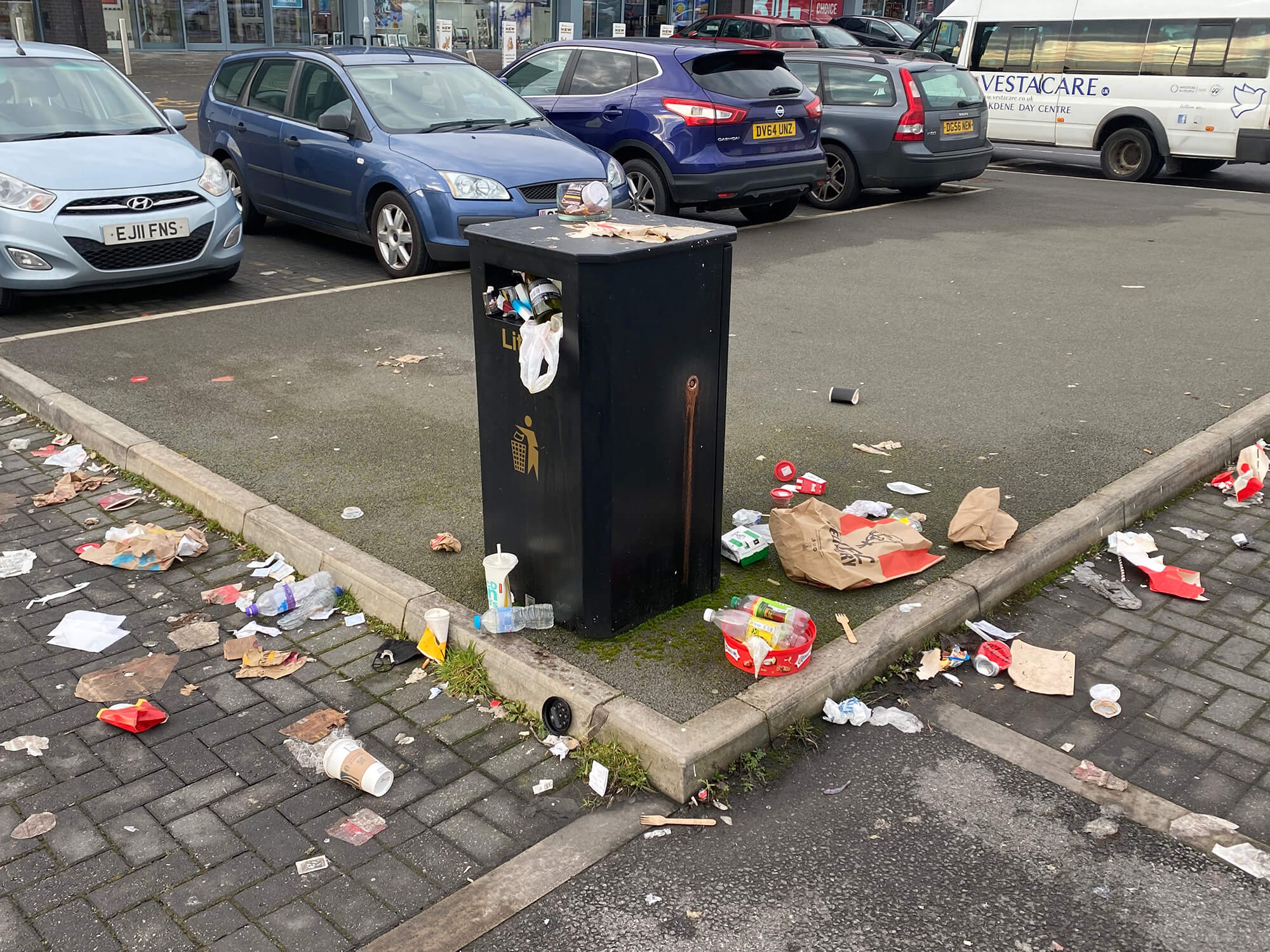

24/06/2023Major New Research undertaken by Clean Up Britain
We recently sent Freedom of Information (FOI) Requests to all England’s 318 Councils, asking them various questions about their approach to litter fines, enforcement and litter bin provision. Have a look at the attached spreadsheet to see what your local Council does. If it’s missing, that’s because they didn’t respond.
These are the topline findings:
- A large number of Councils responded to our 10 questions – 261 out of 318. An 82% response rate.
- In 2021/22, 21% of Councils issued ZERO fines for littering – ie. in their areas, litter is an unpunished criminal offence.
- 66% of Councils issued less than 2 fines a week. Pathetically paltry!
- Private sector enforcement companies are massively more successful at enforcing the law (against littering) than in-house Councils workers.
- 50x more fines are issued for car parking contraventions compared to littering offences.
- Compared to 2018/19, the annual average number of littering fines has dropped by 54% from 1,382 to 633.
- Astonishingly, Councils have no real idea of the number of bins in their area.

10/05/2023Ever wondered why there is so much litter on the roads? Part 1…
This is going to be part of a short series of blog posts where we try and give the general public an idea of why there is so much litter along the UK’s roads and also start helping people to take action.
We say ‘start helping people to take action’ because, unfortunately, responsibility for litter clearance can be annoyingly complicated. This post is a summary of the simple part.
Anyway – you may have noticed that the UK’s road network is often heavily littered with everything from large debris to road signs to cans, bottles and other packaging. It makes for pretty depressing viewing.
But what can you do as a member of the general public? Who do you go to? Who is accountable?
The simple part to this answer is that the motorways are managed by Highways England. So if you want to report a particularly littered motorway stretch, you can email them on info@highwaysengland.co.uk
Keep your email short and to-the-point, be specific about where the litter is and ask them to clear it away. If you don’t get a reply or see any action taken, email again. If you want to let us know how you get on and if you get any response, please do – we like to hear real-life stories and may share them on this blog. We can be contacted on info@cub.77-68-84-167.plesk.page or on Twitter @cleanupbritain
We now get to the next (and more problematic) part – the A-roads. These are often the most heavily littered for reasons that will become clear.
So – Highways England are responsible for some of the A-roads; the map below is the only information Highways England release to clarify which roads/stretches of roads those are. You’ll notice there is no detail about which specific junctions are covered by them – we are working to get more detail on this as well as getting a higher resolution image. Anyway you can, in theory, simply do the same as above to report litter on these roads/stretches of roads.

However, the rest of the A-road network is managed by local borough and district councils, meaning some A-roads may go through 6 or 7 of these. There are frequently no signs showing which council is responsible for which stretch, no obvious way to report litter and there is the complication that the councils don’t have the power to close roads to litter-pick – something which is often used as a reason not to litter-pick. It is also often not clear who looks after roundabouts, slip roads and connecting roads.
We will be providing more detail on this as well as some suggestions about what to do about it in our next post.
In the meantime, at least you know who to approach about the motorways…
Comments are closed.
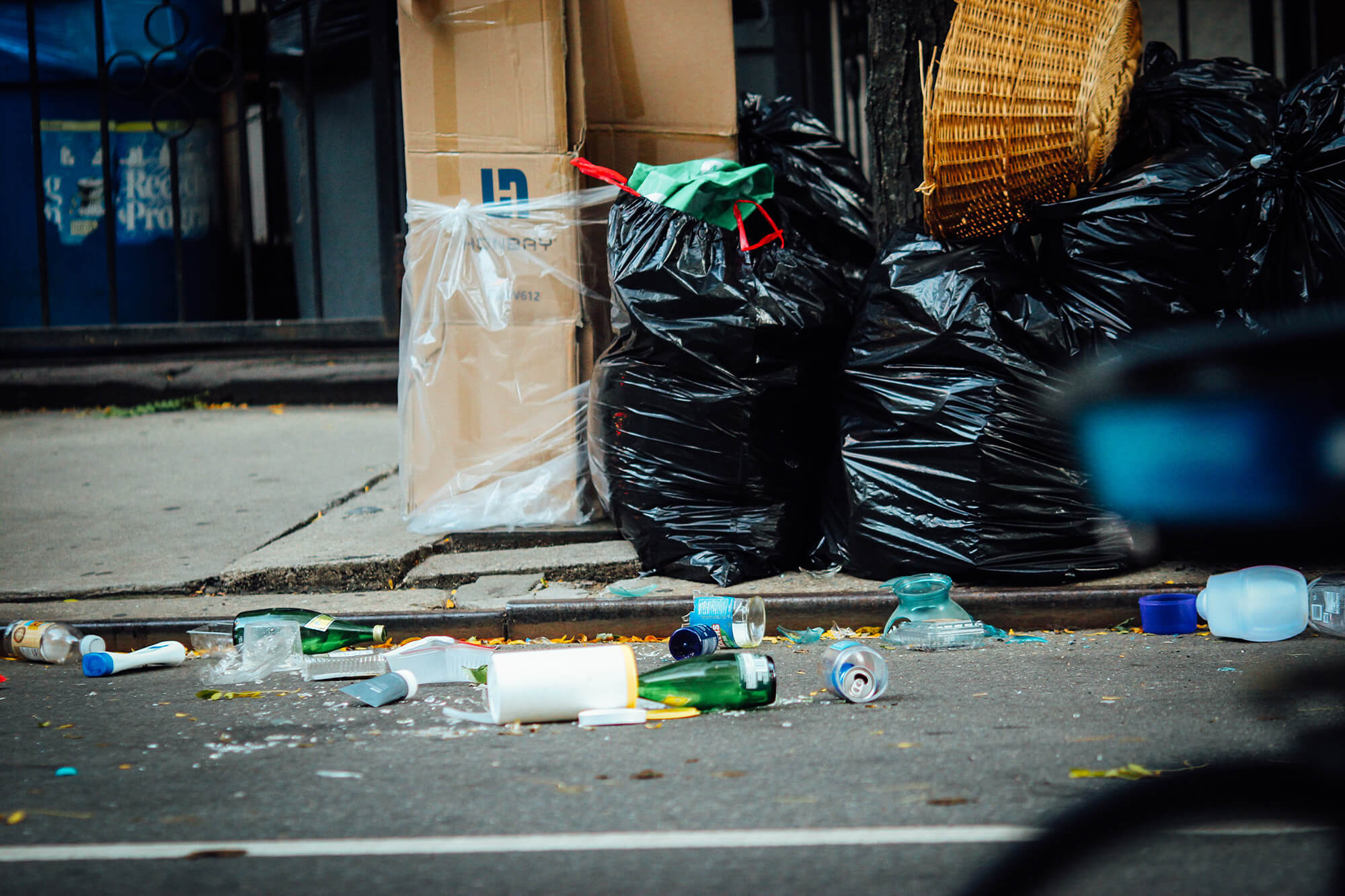

13/03/2023Clean Up Britain launches 10-point Motorway Action Plan
Today, Clean Up Britain (CLUB), the only national campaign 100% focused on solving Britain’s litter and fly-tipping epidemic, is launching a 10-point ‘Motorway Action Plan’ to clean up England’s filthy, squalid and hyper-littered motorways. This is what we’re proposing:
- That National Highways does what it’s required to do by law: “ensure its roads are kept clear of litter” – as required by Section 89 of the 1990 EPA
- Close motorway lanes/slip-roads to clean up litter (and erect signs saying: ‘Sorry, this lane is closed for x days because of selfish drivers who litter’
- Use motorway gantries to say: ‘Littering is anti-social: We’ll fine litterers’
- Erect cameras at all motorway slip-roads junctions/roundabouts (the worst spots for littering)
- Ensure National Highways’ staff/contractors stop dumping thousands of metal signs, cones and sandbags by the side of roads (which they do)
- Set up a dedicated website for members of the public to report and upload dashcam evidence of drivers littering (www.DashCamEvidence.Org) + Erectlarge signs on the motorway – and in service stations – advertising this facility.
- Start behaving professionally and not issuing ‘financial penalty-free’ contracts, and start checking the (often sub-standard) work of contractors. National Highways admit to not checking the work of any contractors’ at the moment – unbelievable! No private company would behave like that
- National Highways to actively seek the powers from the Secretary of State for Transport for its Traffic Officers to be able to prosecute drivers on motorways who litter.
- Support CLUB’s calls to increase littering fines to £1,000…
- … and for drivers who are convicted of littering, while driving, to have their driving licence endorsed by six penalty points
-
Lee 2 years ago
The amount of litter on motorway is a national disgrace,the amount of old cones metal roads signs old tyres and litter is awful and should be cleaned up,with the amount of roadworks going on and lanes closed it would be ideal to get them cleaned as the section is closed makes sense to get road contractors local council and highway agency to come together and get it sorted 🤬
-
Debra Morley 2 years ago
I regularly travel by coach from Nottingham on the M1, north to Leeds and south to London, the M50 to the M6 north & also many other motorways. The whole length of these highways are full of litter. There is no clear patch of the MI in its complete length from Nottingham to London for instance. It is mostly stuff thrown out of cars and lorries, some of it by the bin bag load and also other items left by contractors. It is absolutely disgusting and it really gets me down seeing it. The visitors to this country must think we are a filthy nation and currently it seems we are. These roads are in a desperate need of a clean up and more cameras and high fines are needed immediately. (Can someone please design a large scale vacuum to suck up the smaller items?!) We need action now, not just words.
Comments are closed.
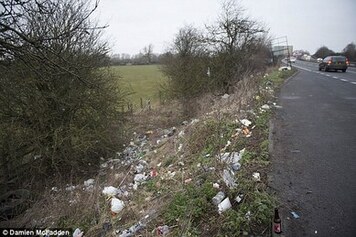
14/06/2022Councils have no schedule for litter-picking the A21
As an update to our recent summary of Freedom of Information request findings, we have also been asking councils for details on how often they litter-pick the A-roads in their area.
Sevenoaks District Council deny responsibility for litter-picking the A21, saying that it was last done by National Highways/Kent County Council in July 2021 and they are not aware of any current plans to do it again. Previous responses from them confirmed that they have never litter-picked their central reservation area and believe this to be the responsibility of National Highways (even though it is quite clear in NH’s one published, publicly-available map that they are not responsible for any part of the A21, and neighbouring councils and Kent County Council have confirmed that the district and borough councils are responsible for the road).
Tunbridge Wells Borough Council took months to provide the information about their litter-picking schedule, and when provided, it revealed that their section was last litter-picked in October 2021 and is just about to be litter-picked again. Their original response to our query also stated that they believed Kent County Council were responsible for litter-picking, although both they and KCC have subsequently confirmed that this is not true.
While this is just two councils, it is indicative of the chaos out there which produces the visible results along the UK’s A-roads.
If you have done any Freedom of Information requests to find out whether your local authority regularly litter-picks any A-roads which run through them, please do send them in to us on info@cub.77-68-84-167.plesk.page
-
Vaughan Young 2 years ago
I have written over the years to Essex County Council, Ipswich Borough Council, Colchester Borough Council,
Babergh District Council. Frankly I would have more success talking to a rock. I have written again to Colchester Borough Council CEO about the atrocious condition of the A12 ( …applies equally to the A14) the regular littering and now fly tipping in broad daylight.
Keeping it very simple, the litter is not being picked up. There is no effort to catch and prosecute. It is all too difficult and complicated.
I would happily share some detail of of past letters but I wonder why these two major arterial roads A12 and A14 connecting Felixstowe the biggest port in the UK and also the port of Harwich to the rest of the UK is not centrally managed. Each council these roads pass through is responsible for litter picking and each point the finger at the other as being responsible. Can we campaign for central management of these roads – then with just one authority to hold to account/ -
John West 2 years ago
I had precisely the same problem. I contacted National Highways about the A14 and they said they had ‘leased’ the litter picking to the council. I then phoned Suffolk County Council who said, after being passed from pillar to post, that the A14 was not the responsibility of one body. I requested that the road be cleaned of litter and they assured me it would. Two months later and the waste is still there. I once even saw the ridiculous sight of one stretch of the road litter picked but the next litter-strewn section was left because it was not their responsibility as that section was managed by someone else. To be honest, I think the council doesn’t give a damn about the issue and regards people like us who raise the problem as an irritant. It’s a joke as the council is always banging on about their commitment to green issues but then allows their roads to become rubbish dumps.
-
Julia Squier 2 years ago
This is all so familiar; the A12& A14 are shockingly filthy , especially noticeable at this time of year. The most successful strategy we’ve had in getting the DC’s ( in this case East Cambs DC & A14) is to tell them the local MP is visiting the area together with a journalist & photographer-magic clearing of lay-bys , though the verges still smothered. Another threat is to raise a Litter Abatement Notice.
I wish the Times would follow up their Clean It Up water campaign with a litter one…
Comments are closed.
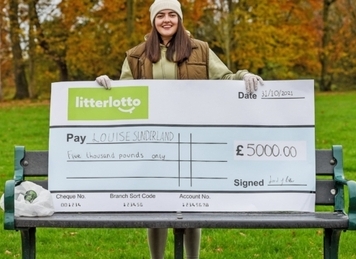
30/05/2022Litterlotto – did you know you could win prizes for binning litter?
No, neither did we – and usually we don’t promote litter picking, on the basis that it is not the public’s job to be a sticking plaster for inadequate local and national services.
However, Litterlotto combines binning litter with free entry into a prize draw with regular spot prizes and monthly jackpots, all supported by brands that want a cleaner environment. So there is really no reason for us not to spread the word and encourage people to go for it and potentially get something for their efforts.
To get involved, you need to download the app onto your phone, read their ‘Getting Started’ guide and that’s pretty much it!
Visit www.litterlotto.com
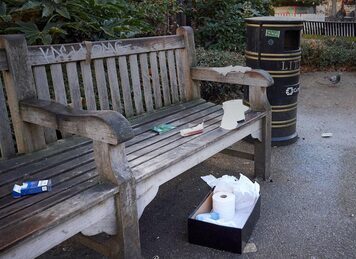
19/05/2022 Our Councils FOI Research Project
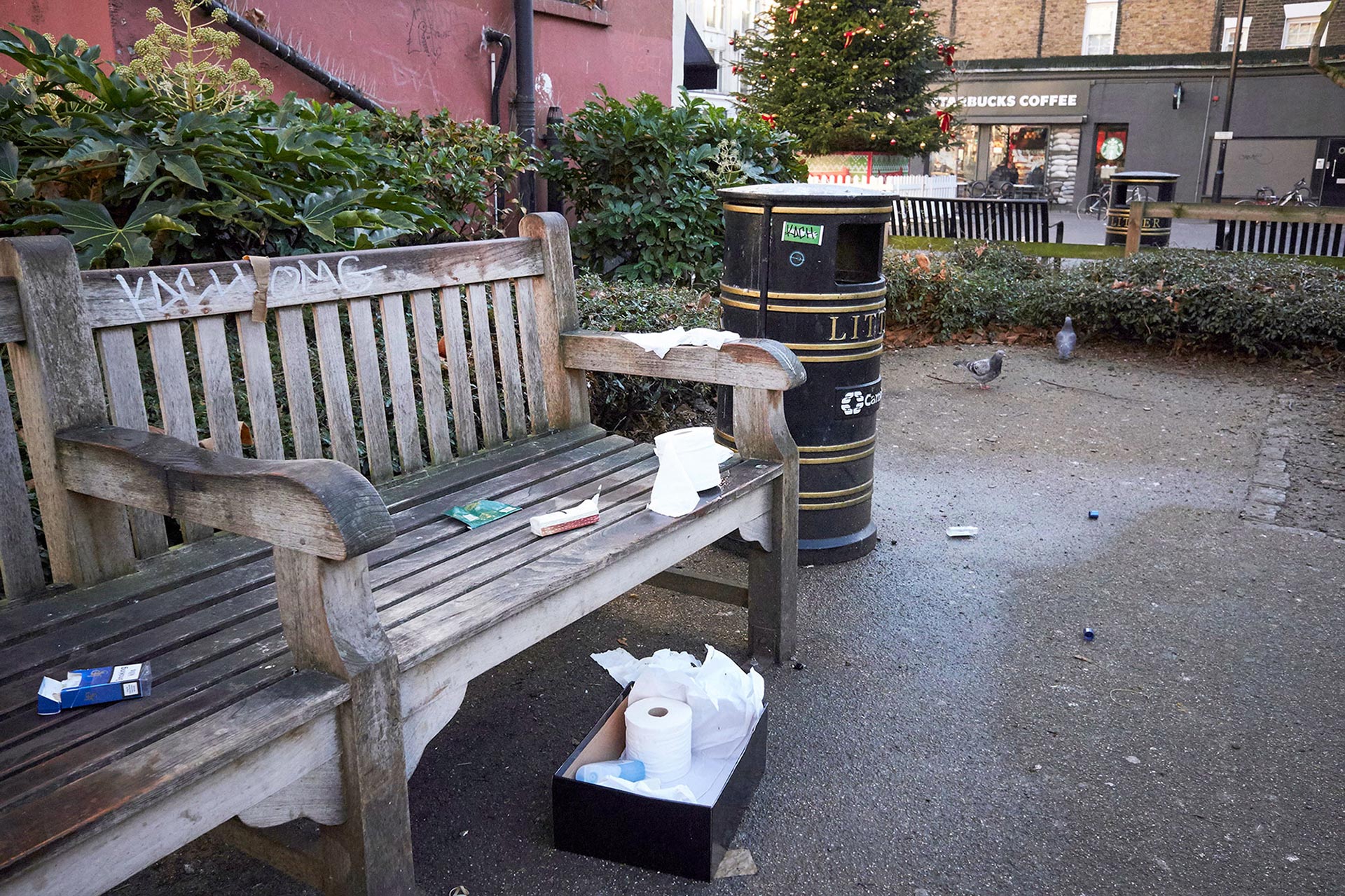
19/05/2022Our Councils FOI Research Project
Since the end of 2021, Clean Up Britain has been engaged in a project to get further into the details of what is happening up and down the country with regards to councils and litter action.
A group of Local Champions have been sending requests to their councils to help us answer some key questions about litter prevention in England.
At the time of writing, there are 330+ local authorities in England alone – this makes it a pretty significant task to get round all of them and collate the responses. However, we have already contacted a very significant sample size of 70+.
This means we are getting a pretty good idea of why things out there look like they do.
Here are some initial headlines:
– Councils which use private enforcement agencies issue significantly more fines for littering than those which don’t
– Almost all the councils which use private enforcement agencies have contracts in place which are at least cost-neutral
– Some councils don’t know how many bins they manage
– Some councils have responsibility for managing bins and some apparently don’t
– Virtually no councils separate out the cost of litter picking from their overall street cleaning contracts, meaning the true cost the of the problem is difficult to identify and therefore reduce
– The amount that you are fined for littering and the likelihood that you will be fined for littering varies hugely from one area to another
The picture is a mix of definitely good and definitely bad practice. It is also highly fragmented, which raises the question of why some of these important maintenance issues are not more standardised across the country – are things really so different in Tonbridge & Malling, Waverley and Amber Valley..? And why, when the answers and outcomes are often so clear-cut, is there so little consensus and sharing of best practice?
More to follow as further findings are analysed.
-
Mark Hood 3 years ago
Odd that you mention Tonbridge and Malling where littering and street cleansing is a big problem and where I have just got the results from my FOI back. Really disappointing results where we now know that only two fines were issued in the last year and the frequency of street cleaning has reduced significantly.
-
R D Murray 3 years ago
We live in a very rural area, the village covering 27 sq. miles. The problems are ordered as follows: dog walkers and dog shit left in plastic bags on lanes and footpaths/bridleways; cyclists and motorists throwing away empty drinks cans/plastic bottles into verges; sweet wrappers and paper; farmers’ black plastic sheeting; plastic supermarket packaging of sandwiches/pies. We pick this up weekly, separate it out, and recycle as much as possible. Our problem is mostly visitors from cities/towns not taking their litter back home, rather than dumping it for the ‘dog shit fairy’ to clear up after them.
-
Steve Bullcock 3 years ago
Hi in our area the local authority Barnsley ( BMBC) only street clean main thoroughfare on a scheduled basis – residential streets don’t get any attention only from volunteers.
Fly tipping database deployed and available to the public by the council is not fit for purpose and resolutions are poor with many cases passing the councils own 5 working day resolution ( post report)
Something else Barnsley council are world class at is applying yellow and black sticky tape onto reported fly tipping stating “ under investigation BMBC aware” then leaving for weeks on end before cleared up.
Another big concern in our area is the high volume of street furniture covered In graffiti / tags this street furniture is owned by the large companies such as BT/ Virgin council state these are not the responsibility of the council even though they are located on our streets somebody should be forced to clean these up and anti graffiti paint applied to stop recurring problems.
-
Kate Honeyford 3 years ago
Brighton and Hove – I just despair. There is the big public litter issues after events on the beach for eg that get big publicity and big clear ups. Then there are the residential areas where one dispiirited street sweeper tries to keep up with the dropped litter, dog poo in and out of bags and, big problem here, rubbish from overstuffed bins(usually outside HMOs) blown onto the street or pulled out by foxes and gulls. Then in the country areas there are the people who chuck rubbish over their back fence for years as well as fly tippers, over flowing litter bins and dropped rubbish.
-
Allan K 3 years ago
Mmm you have to be realistic when it comes to litter. Fines are useful for fly tipping but not much else as it’s almost impossible to enforce every piece of litter that is dropped.
A more useful way of spending any budgets would be to invest in a vigorous street cleaning regime, putting bins in convenient places and primary/secondary school education. This will have short and long term impacts on the amount of litter around as ultimately it is an attitude problem of those that drop it in the first place and you also have to accept that there will always be people who drop litter…..unfortunately. -
George Redpath 2 years ago
Here in Lowestoft (East Suffolk Council), over the past three years I’ve bean in constant communication with the Environmental leader who is responsible for the contract with the appointed refuse company.
Geez, it’s been painful, hard work, frustrating and ultimately dealing with a fragmented council organisation where the left is not sure what the right is doing, and a culture of, ‘not my problem mate’ 🙁
What’s so frustrating, are the points I keep highlighting are not rocket science i.e. get out from behind your desks and monitor the areas you are responsible to maintain (litter), but surprise, surprise it does not happen. The reality is, the council rely on a minority of the public such as me to report short fall’s, where litter is allowed to accumulate, no plan in place to rectify, they rely on the refuse contractor to monitor, but not actually in their contract to do this.
I could go on with a litany of excuses from our council who want to put the onus on educating the public, well that’s fine but what about the litter that’s piling up in the interim??
I shall keep reporting overflowing bins, areas where there are no bins, areas where no litter picking takes place nor is planned within the refuse contract etc. etc.etc.-
John West 2 years ago
I often visit Lowestoft and I’m appalled at the state of the roads leaning into it. The A14 is a disgrace with litter-strewn laybys, roundabouts and verges. The B roads are not much better and you have to wonder why no one at the council appears to think it’s a problem. As you say, they wait for it to be reported rather than have people regularly check the roads. They claim they want to encourage people to visit Lowestoft but do precious little to make the place look inviting for visitors. Driving into a town along a litter-covered road is not exactly going to make those people want to come back!
-
John West 2 years ago
Typo – Roads leading into it I mean.
-
-
-
andrew blakey 2 years ago
Where do we start….? At least the issue is becoming an issue,slowly.
1)education….1970’s style public information ads
2)fines for dropping litter and penalty points on l/c if from a car
3)technology….cameras at roundabouts and junctions
4)private enforcers like they have in london for illegal parking
5)name and shame worst areas…. and litter offenders
6)prisoners should earn reduced sentences by litter picking
7)petition mp’s for action…!!!trying to be positive,but i think city centres have become cleaner…(?) and whilst we are on this subject,grafitti has become a major problem too…!!!!
Onwards and upwards….!!! -
Paul Jacklin 2 years ago
We have a horrendous situation in this country, I live in Lincoln, a City noted for its history, its universities and rural charm. How come every major approach road into the City is littered with all sorts of detritus that can be thrown from vehicle windows or even fly tipped on the verges? This has to stop, how can the situation have ever got this bad? At the moment I am embarrassed to call myself British.
Comments are closed.

06/05/2022DEFRA and KBT Guilty of Delusional Greenwashing
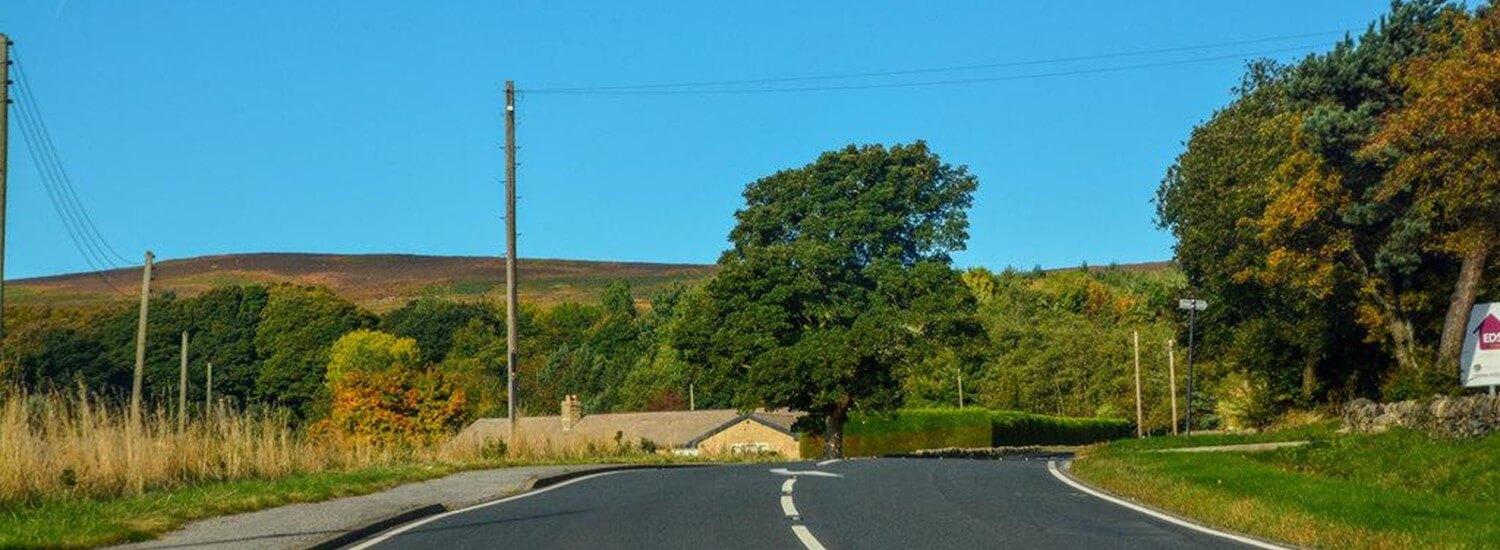
The following statement – apart from being delusional and untrue – would not have been out of place if issued by the Politburo in the former Soviet Union!
“The cleanliness of the city’s roads has been acknowledged by central government, following an independent assessment of roadside litter levels in areas maintained by local authorities and Highways England. The assessment was carried out by UK-based environmental charity, Keep Britain Tidy, on behalf of DEFRA, whose analysis congratulated Sheffield City Council for maintaining a consistently high standard of roadside cleanliness.
Are they being serious?
Anyone who lives in or near Sheffield knows that the city suffers from a severe litter problem. It’s also true to say that Sheffield City Council has no discernible litter strategy, and that if it wasn’t for the tireless and community-spirited work of Sheffield Litter Pickers and other local volunteers, the city would resemble downtown Dhaka.
The city is covered in litter – as indeed is the whole country. Consider the words of local Sheffield MP, Clive Betts:
“I’m ashamed, angry and embarrassed – our country is a filthy, littered, disgrace”
This aforementioned ‘assessment’ was carried out by Keep Britain Tidy – an organisation well past its expiry date – that has been the recipient of £100m+ of taxpayers money from DEFRA (Dept for Environment) and who many people know as ‘DEFRA’s litter lackeys”.
As Jeremy Paxman, Clean Up Britain’s Patron, says… “Keep Britain Tidy are even more useless than DEFRA” – and that’s saying something!
So, what we have here is one useless organisation telling another useless organisation that Sheffield City Council are doing a good job.
Given the vast volumes of litter in and around Sheffield which is collected by volunteer litter pickers every week, forgive local people if they find this so-called ‘independent assessment’ little more than deceitful state sponsored propaganda.
And just so people know, Sheffield Litter Pickers go out a few times every week, and collect between 40-60 bags of litter from Sheffield streets in only a few hours.
If anyone is keeping the city clean – and deserves an accolade – it could be argued it’s them.
Sheffield City Council need, in the first instance, to do three things….
Firstly, implement a highly professional anti-litter behavioural change campaign. Not the half-baked and ineffectual version that DEFRA has cooked-up behind closed doors with Keep Britain Tidy.
Secondly, ensure that active and high visibility litter enforcement and fining takes place in Sheffield. As behavioural change experts, we know that the perceived fear of being fined is a powerful deterrent to litterers. Ideally, this needs to be done by a private sector company, as in-house Council enforcement fails in most places.
Thirdly, provide funding and genuine support to fantastic local groups such as Sheffield Litter Pickers and Love Our Streets.
Failing this, they should have the courage and honesty to say to the people of Sheffield that they have given up on the fight against litter, and are merely interested in engaging in the sort of misleading pretence perpetrated by Keep Britain Tidy and DEFRA.
PS. The below four photos are more representative of what Sheffield actually looks like, and were all taken by local people.
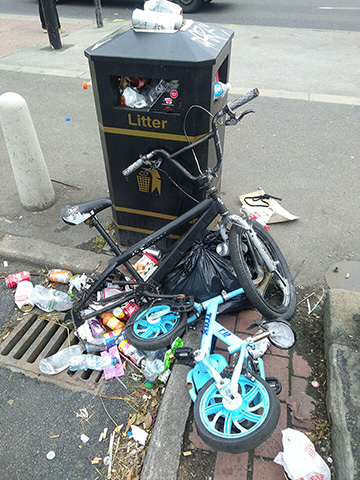
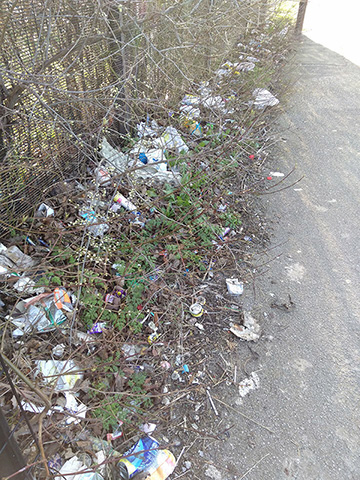
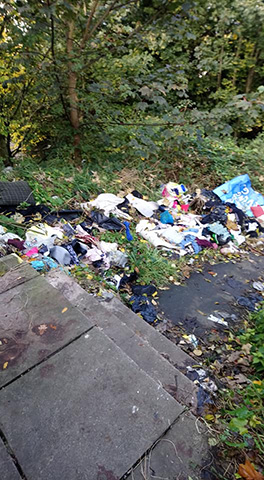

-
Judy Rimmer 2 years ago
Boroughs of Merton and Sutton in south London look like that too, despite both having massive and expensive contracts with Veolia. Veolia stitch up these inefficient, ineffective and thoroughly incompetent councils into contacts so smart and tight the Council become impotent.
-
Caroline Spence 2 years ago
I would love to know nationally how much councils spend from budget on litter picking and prevention. It’s filthy where we live and it’s volunteers who keep it clean.
-
@cleanuptadworth 2 years ago
That could be anywhere in the uk
-
Umme 2 years ago
This is the same in Cranford, next to Heathrow. Tourists must regret coming to the UK when the first thing they come across is miles and miles of litter and fly tip. It is a bad impression of the UK. Very bad.
Comments are closed.

28/03/2022 New film fronted by funny man!
28/03/2022New film fronted by funny man!
As part of our anti-cigarette litter behavioural change campaign in Bristol, we’ve produced this very short film, fronted by the comedian, Marcus Brigstocke. The concept behind it is that we use a bit of humour to try and convey key campaign messages directly to people who have been fined – by Bristol City Council – for littering in Bristol. Last year, there were over 7,000 people. Litterers who agree to watch the film at home online, and answer three questions about it, are given a 50% reduction in their fine. Hence, we’re undertaking a UK-first in terms of combining enforcement and education at the same ‘point of sale’… if we can put it that way!
-
Elizabeth Cross 3 years ago
Hmm, an interesting and informative message presented humorously. Well done to all involved, But it’s not difficult to watch so to give a 50% reduction in the fine is very generous IMHO.
Perhaps a 10% reduction in the amount of time carrying out restorative justice in cigarette butt retrieval would strike home?
Either way, education is key. To the young especially, as I do believe lessons learned early in life, and reinforced throughout every stage of growing up, help. -
John Read 3 years ago
Many thanks for your comments Elizabeth. Perhaps 50% is generous, but we have to entice people to watch the film – which is entirely their decision and we cannot force – so that’s why it’s set at that level. Totally agree with you that lessons learnt early in life are much more likely to stick and be acted on. John
Comments are closed.

25/11/2021Government Consultation on Banning Commonly-Littered Single-Use Plastic
If you are concerned by the amount of litter you see, whether it is in parks, town centres, on roadsides or on beaches, please do give your views to the government by filling in this consultation:
We know there is no quick fix to the litter problem but the highly-successful plastic bag charge has led to a huge reduction in plastic bag littering.
A story in The Times yesterday highlighted that one beach litter-pick project run by the Marine Conservation Society found that 13 bags/100m stretch of beach in 2013 had reduced to just 3 bags/100m stretch this year – the charge was introduced in 2015. Similarly, since Scotland banned plastic cotton bud sticks in 2019 and England did in 2020, instances of these per 100m have reduced from 15 to 6. So government interventions can have a really significant impact.
Don’t miss this opportunity to have your say and make sure our roads, towns, rivers and beaches are included in the current rhetoric about protecting the environment.

07/11/2021Interesting litter study on Bournemouth Beach
Apologies to those for whom this article is behind a paywall, but if you are a Times subscriber this is an impressive and interesting study and worth reading.
Glow-in-the-dark bins show litterers the light on Bournemouth beach
Using drones and analysis of the litter they observed, glow-in-the-dark bins and ‘ballot bins’ (which make depositing litter the subject of a fun preference question) were installed in strategic locations on Bournemouth beach.
An reduction of 88 per cent in glass bottles and aluminium cans was observed as a result of the glow-in-the-dark bins and ballot bins resulted in a 73 per cent reduction in discarded cigarette butts.
To ensure a fair comparison, one side of the beach used this approach while the other did not – overall, on the side which had the trial a 79 per cent reduction in litter was observed while there was no reduction on the other side.
The project was funded by McDonald’s, the drones were operated by Ellipsis Earth and the project was carried out by Bournemouth, Christchurch and Poole Council in partnership with Hubbub, an environmental charity.

11/10/2021 Local Champions programme launched
11/10/2021Local Champions programme launched
We are pleased to announce that over the past few months, Clean Up Britain has launched a new initiative to raise awareness of litter at a local level and and encourage action.
Our network of Local Litter Champions will be reporting issues to their local authorities, monitoring progress and requesting information on how local authorities manage litter clearance. All this will help inform our national campaigning as well as highlighting different practices, good and bad…
As well as providing the practical help above, the group exists as a way for concerned members of the public to get involved in doing their bit by something other than litter-picking – something we feel is only papering over the cracks in terms of solving the problem.
On this blog we will share some of the Champions’ experiences, updates on the issues faced by those looking to help stop Britain’s litter crisis and some facts and figures on the state of litter management in the UK.
To be kept up to date on our campaigning, don’t forget to follow us on Twitter @cleanupbritain and join our list of supporters. We know we don’t keep in touch that often but as we get more resource we are hoping to do more!
-
Claudine Pearson 3 years ago
We just over the M40 from you! Hello from Rubbish Friends (Stratford upon Avon).
Comments are closed.

07/10/2021 Major flaw exposed in the Environment Bill
-
Emma Braga 3 years ago
Our beautiful countryside is ruined with rubbish in trees, hedges and ditches everywhere I look. We have completely lost our self respect and it all looks dirty and uncared for we should be ashamed. Other countries don’t have this problem, we need to penalise large companies that produce litter.
-
Glenn McLernon 2 years ago
I am so proud of our country on the one hand but on the other, I am ashamed. I am ashamed of the epidemic litter and rubbish strewn along our road sides. This has to end. The more rubbish there is along the roads, the less people will respect the roadsides and so the more rubbish there will be. The highways agency and the councils need to, kick ass, to get this done. Come on you guys, this is your job, or don’t you care about our lovely country.
Comments are closed.
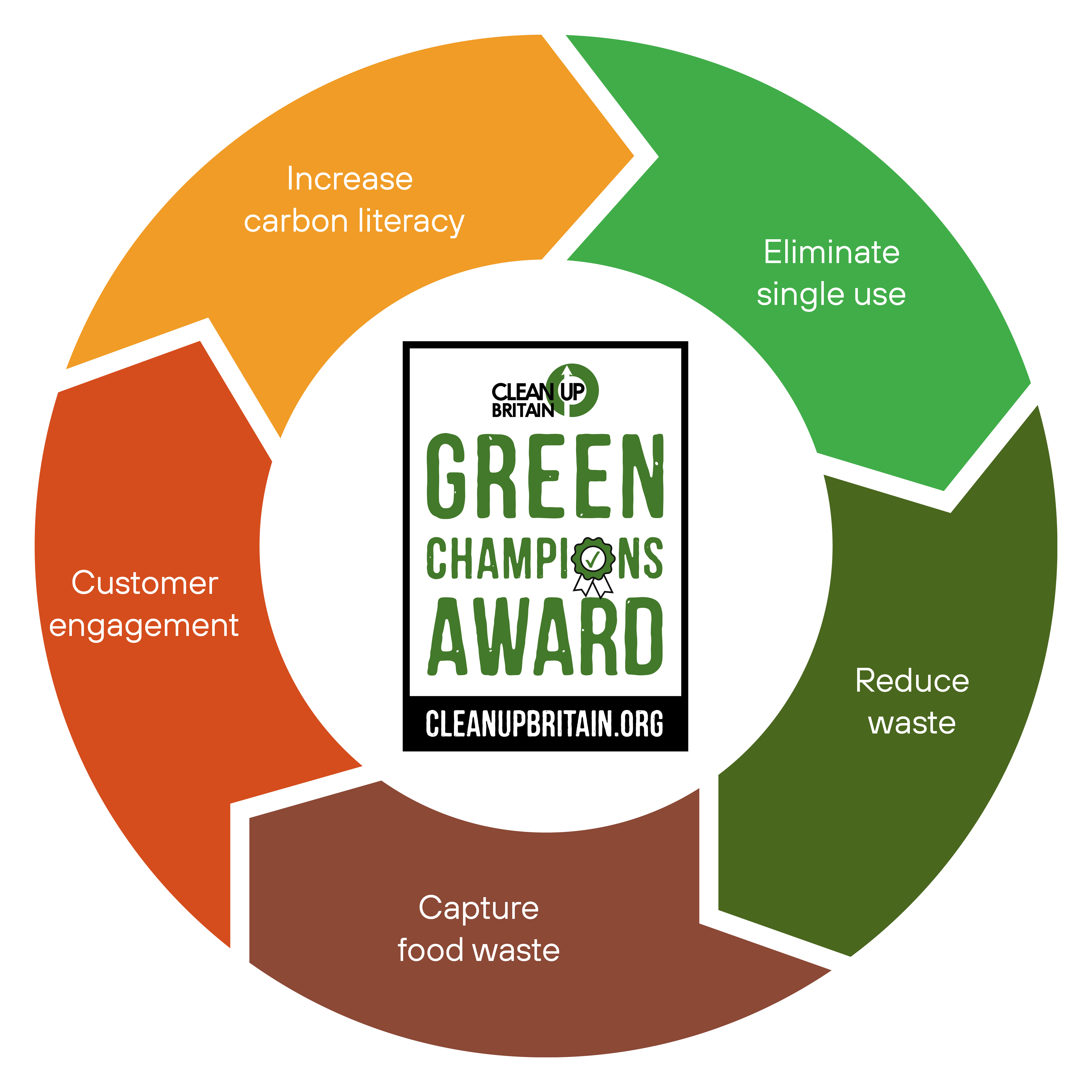

22/10/2020New award helps organisations improve their environmental behaviour and, in the process, their corporate reputation
Clean Up Britain, the national anti-litter and fly-tipping organisation, is today launching the Green Champions Award, in collaboration with four industry-leading partners.
These are Event Cup Solutions, FSG, Reconomy and Zero Waste Events.
The Green Champions Award is about asking organisations to embrace sustainable operating practices and to educate their key stakeholders, be that customers, festival-goers, fans or students and staff.
John Read, Founder of Clean Up Britain, said:
“Quite simply, we’re asking – and helping – organisations to achieve the highest standards of environmental behaviour.
In the wake of the COVID-19 crisis, we’re all even more aware of the fragile nature of our global eco-system. There is now an acute need for organisations and individuals alike to embrace more sustainable behaviour. In fact, many consumers are, increasingly, demanding it”.
Since Covid-19 emerged, Kantar, the leading data insights consultancy, has reported that over 49% of people say that they now “actively seek out companies and brands that offer ways to offset their impact on the environment”.
The Green Champions Award covers five specific areas:
- Elimination of single use food and beverage packaging
- Reduction of general waste and an increase in recycling levels
- Reducing, capturing and recycling food waste
- Consumer engagement to reduce littering and improve the provision of ‘binfrastructure’
- A commitment to increase carbon literacy across the organisation
Clean Up Britain Campaign Chairman and former Scotland rugby international, Kenny Logan, said:
“It seems evident that the social responsibility expectation of consumers has become more demanding and discerning. The corporate reputation of an organisation can, undoubtedly, be enhanced through transparent evidence of its sustainable environmental practices. That’s what the Green Champions Award helps deliver”.
For further information, please contact John Read at john.read@cleanupbritain.
-
Len Darby 4 years ago
Hi
I would like to try and get involved somehow?Me and my staff have been litter pickering a certain area of Canvey Island in Essex since April.We then join a local litter group in our area Castle Point Clean Up Crew but we have become disillusioned with the group as they seem to focus on litter picks rather than find a solution to the problem i.e what are the council and there contractors doing. Councillors must be laughing
behind our backs when a membership of 533 seems to be doing the work of the contractor.
Hope you can help? -
Alice 4 years ago
Good that consumers are interested in this – hopefully more pressure will help see some action.
Comments are closed.

08/09/2020 Check it Out – New Campaign Tee-Shirts!
08/09/2020Check it Out – New Campaign Tee-Shirts!
We’ve just launched our new Tee-Shirt and Hoodie range – so you can join us in the fight against littering.
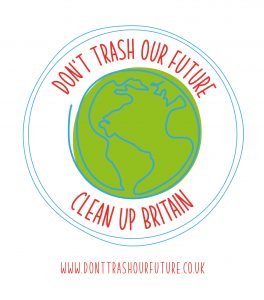
Now more than ever we need to fight for our Environment and litter is undoubtedly one of our most pernicious forms of pollution.
What makes it so deadly is the fact that it’s so commonplace. It’s viewed as a part of everyday life in the UK. But do we want Coke cans, cigarette butts, crisp packets and fast food packaging to be part of our landscape? Every countryside ‘idyll’, urban hedgerow, canal, river and our beaches harbouring tonnes of waste?
It’s not sustainable, it’s not good for our wildlife and it’s not good for us either. So, welcome to our new Tee-Shirt and Hoodie range – let’s get the message out there. Littering. Enough.
Join us in the fight against littering today.
Shop Now!
-
Lindsey 2 years ago
As part of a local litter picking group in Surrey, I am constantly dismayed at the lack of coordinated clear up of metalwork, signs, cones and sandbags after a job is completed. This surely is a complete waste of tax payers money . No one takes responsibility. National highways say it is SCC’s fault and SCC blame local council. It’s just shoved in the hedgerows and verges and blights an area for decades to come. It is fly tipping in the most blatant way and shows utter disregard for tax payers money. This happens all over the country. Please can you help and address this at the highest level. I live in hope.
Comments are closed.
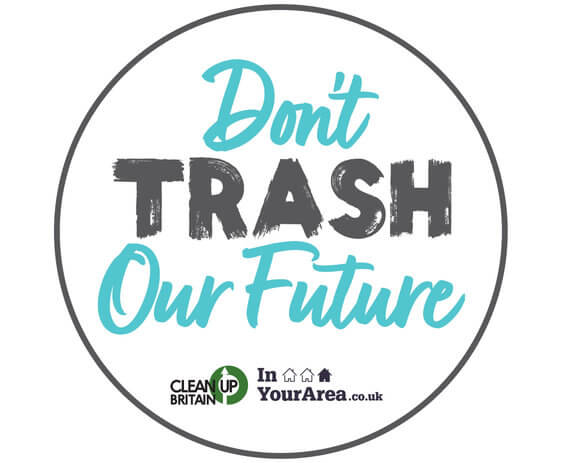
27/07/2020 Major national campaign launched today with Britain’s largest media group
Clean Up Britain has joined forces with In Your Area, the UK's leading local news, information and community platform
27/07/2020Major national campaign launched today with Britain’s largest media group
Clean Up Britain has joined forces with In Your Area, the UK’s leading local news, information and community platform, and JLS singer and farmer JB Gill to launch “Don’t Trash Our Future”, a campaign to deliver genuine behavioural change around littering.
The first part of the campaign involves urging the government to increase littering fines in the UK to £1000, or 100 hours community litter picking and, also to make it compulsory for every local authority in Britain to enforce the law.
While critics may argue the increased fine and community service terms are drastic, there is already a £1,000 fine for owners allowing a dog to ‘litter’ in public space, and not clean it up. In addition, and to compare, there is a $1,000 fine for littering in California; $2,200 Australian dollars in New South Wales and a whopping $10,000 in Massachusetts.
PLEASE SIGN OUR PETITION at: www.donttrashourfuture.co.uk
Increased littering has been an unwelcome feature of the coronavirus pandemic. Streets are soiled, bins are overflowing and parks are left strewn with bottles and wrappers. Laws exist to keep the country clean, but they are either flouted or not enforced on a massive scale – as recent scenes at beauty spots across the UK only serve to prove – so more drastic action is needed to change the behaviour of the public and local councils.
A Freedom of Information request sent by Clean Up Britain to 169 councils in England and Wales found the majority (56%) were issuing less than one fine per week for littering and more than two dozen (16%) don’t issue fines at all*.
A new survey commissioned by In Your Area with more than 7500 respondents reveals:
- 96% people agree litter is a public health concern
- 85% of British adults think litter is a big or major problem
- 90% of Brits don’t know anybody who has been fined for dropping litter
- 64% of Brits believe the problem has worsened since lock down has eased
Commenting on his support for Don’t Trash Our Future JB Gill said:
“It’s great to see that people recognise that litter is a public health concern and a major problem. The only way to stop the damage being done to our health, nature and wildlife is to sign the Don’t Trash our Future petition, object to local councils not enforcing fines and demand a higher penalty for those dropping litter.”
It is hoped that the increased fine and pressure from members of the public on local councils to enforce it will result in a dramatic shift in attitude towards litter and waste. Commenting on the matter Merle Van Der Akker, President of the Behavioural Insights Team at Warwick Business School said:
“It is not about the absolute value of the fine, it’s about the message it sends. This level of fine tells you that this behaviour is deemed costly, and quite frankly unacceptable. Sometimes it does take drastic measures to get this message across. From a behavioural science perspective, presenting people with such a message triggers a response of shock, because of the sheer size of the fine. People then reason that if the fine is so big, the issue at hand must be of great importance or urgency. This is how you get people to pay attention and take action. No one wants to be fined £1000 for throwing away a £1 can of drink.”
John Read, Founder of Clean Up Britain said:
“Fines need to be increased to a level which shows the Government – and society generally – will no longer tolerate this antisocial and selfish behaviour. In addition, we also need to ensure fines are a credible deterrent, by making it compulsory for councils to enforce the law, which currently it’s not.”
Commenting on Don’t Trash Our Future Ed Walker, Editor-in-Chief for In Your Area said:
“In Your Area are proud to be working with JB Gill and Clean Up Britain to tackle the country’s litter and waste epidemic. Our users are sick of seeing their neighbourhoods being treated like rubbish dumps. Don’t Trash Our Future will hopefully make councils and members of the public think harder about the littering issue.”
-
Ian Turnbull 4 years ago
See email trail below – any comment?
Caitlan (McDonald’s Customer Services)
30 Jun 2020, 09:44 BST
Dear Ian,Thank you for contacting McDonald’s Customer Services about litter in your local area
We’ve been working hard to reduce the amount of litter on our streets, but we know it’s frustrating for residents and businesses alike when members of the public choose to dispose of their litter irresponsibly. For many years we have been sending out daily litter patrols and organising larger ‘clean up’ events.
Every McDonald’s restaurant sends out a minimum of three litter patrols each day, which means that across the UK, our staff walk thousands of miles a week completing litter patrols.
We’re also proud to work with organisations like Keep Britain Tidy, Keep Scotland Tidy, Keep Wales Tidy and Keep Northern Ireland Tidy, alongside our own suppliers, to try and reduce the amount of packaging we use and make as much as we can recyclable.
We value customer feedback, and I’ve passed your comments to the management team at the restaurant to use as part of our regular reviews.
Thanks again for taking the time to contact McDonald’s Customer Services. If we can be of any assistance in the future, please don’t hesitate to contact us back.
Kind regards,
Caitlan
Customer Services TeamMcDonald’s UK Customer Services
11 – 59 High Road
East Finchley
London
N2 8AWIan Turnbull
29 Jun 2020, 18:12 BST
See Filthy Britain SOS on Channel 5, Sunday 8pm. I think it’s up to the council to decide.
Sent from Mail for Windows 10
Retygan (McDonald’s Customer Services)
29 Jun 2020, 11:27 BST
Dear Ian,Thank you for contacting McDonald’s Customer Services.
I am sorry to say we will not be able to implement this due to the fact we will be unable to monitor accurately if someone has discarded their rubbish accidentally or on purpose.
Thank you for your suggestion however, I will raise this with the appropriate teams.
Kind regards,
Retygan
Customer Services TeamMcDonald’s UK Customer Services
11 – 59 High Road
East Finchley
London
N2 8AWIan Turnbull
28 Jun 2020, 20:55 BST
Could you print receipts on packaging? I think this would help reduce litter by tracing it to customers.
-
Dora 4 years ago
Why don’t we take example the way Japan is spotless .
1 You have to be proud how you are respect your self, your country , your older s, your surroundings.
The school children 👶 they are the cleaners for there school,
They starting early age 6/7 us my grandson is !
In groups from the play grounds,to the class rooms to the toilets ,
When you cleaned your self you want mess it up !!! Is in your mind for the rest of your life 👍
Well done Japan 👍👏 -
Dora 4 years ago
Why don’t we take example the way Japan is spotless .
1 You have to be proud how you are respect your self, your country , your older s, your surroundings.
The school children 👶 they are the cleaners for there school,
They starting early age 6/7 us my grandson is !
In groups from the play grounds,to the class rooms to the toilets ,
When you cleaned your self you want mess it up !!! Is in your mind for the rest of your life 👍
Well done Japan 👍👏 -
Christine Holt 4 years ago
All take away outlets are handing over their products to their customers which in turn is giving their customers the ammunition to litter our planet. If every time their staff hand over an order to their customers could they have their staff to ask their customers to dispose of the wrappers correctly, giving eye contact. Also huge posters inside and outside the outlets with articles regarding the bad effects of littering. The huge companies that supply the ammunition to litter must take responsibility to help this cause. It won’t allow .e to save my details in this browser??
-
Phil smith. 2 years ago
Regarding Mcdonalds reply saying they send out litter teams everyday is a joke as Willenhall lane in Coventry is filthy and no Mcdonalds worker is ever out there cleaning.
Away from Mcdonalds, why are our major roads so litter strewn and a litter picker along the M6 is as rare as chickens teeth , do the Highways agency ever do any litter picker/ maintenance of the motorwy verges or central reserve………..god damm hate this filthy country we call home
Comments are closed.


24/04/2020What we’re working on now – Our Top 3 Campaigns
At Clean Up Britain, we’re no average litter campaigners. We’re only interested in finding sustainable and effective solutions. In common with most people, we want to see meaningful action that will really start addressing the many deep-rooted issues surrounding litter in this country.
Read on to learn about three significant initiatives we’re working on in 2020.
lobbying campaign to insert a crucial Amendment into the Environment Bill
The new Environment Bill is currently proceeding through Parliament. According to DEFRA*, the Environment Bill will help deliver the government’s commitment to the “most ambitious environmental programme of any country on earth”.
The problem lies in their artificially contrived definition of the ‘natural environment’ – which would exclude roads, pavements, lay-bys and slip-roads. This means that the new Office of Environmental Responsibility (OER) – which is established in the Bill – won’t have the powers to assess whether local Councils all over the country (and Highways England) are fulfilling their legal responsibilities to ensure they keep their land clear of litter.
Currently, every Council in Britain is failing in its legal duties relating to litter clearance and, as the Bill is currently drafted, the OER will not be empowered to hold them accountable. A deliberate and critical omission by the government.
The Action we’re taking
Our team are actively lobbying members of the House of Commons Standing Committee who are scrutinising the Bill. It’s essential that we get the Bill amended. If it’s not, there will be no statutory body who has the remit and power to monitor Council efforts to clean up their local area, and punish them if they fail to do so.
campaigning for McDonald’s to be legally forced to do much more to educate their customers
McDonald’s have over 1200 restaurants in the UK, many of them drive-thru takeaways.
Huge numbers of their customers litter their fast-food packaging – the evidence is strewn all over the country, even reaching rural lanes miles away from where it was bought. Yet McDonald’s do next to nothing to educate their customers on the impact of litter.
McDonald’s have applied for permission to build a drive-thru restaurant, close to Junction 15 of the M40 motorway, on the outskirts of Warwick in the West Midlands. This is our opportunity to set a new precedent on planning conditions attached to this type of development.
The Action we’re taking
Clean Up Britain is running a sustained media and political lobbying campaign, putting pressure on Warwick District Council to impose three additional planning conditions that must be met by McDonald’s before they are granted permission to build.
These conditions relate to anti-litter messaging in and around the restaurant and drive-thru and, innovatively, the installation of an Automatic Number Plate Recognition (ANPR) system to link a customer’s food and drink packaging to their car registration number plate – which would be printed on their takeaway packaging and receipt.
You can read more about the campaign here. Success would set a very important national precedent, and enable us to extend our campaigning for fast-food restaurants to take more responsibility for the damaging environmental impacts of their business.
Putting pressure on Councils all over the country to fine people for littering
We strongly believe that to effectively change littering behaviours, it’s essential that people perceive that there’s a credible threat of being fined for dropping litter.
At present, that perception hardly exists. Many people don’t know that dropping litter is a criminal offence. If they do, they believe there’s no danger of being fined. They’re right. Many Councils don’t enforce the law against littering.
Among the Councils who do fine, the vast majority use their own staff. Most fail to do the job effectively. Not only is it difficult to catch someone in the act of dropping litter, it’s a confrontational and stressful job, which Council employees avoid doing in favour of other less onerous duties.
The Action we’re taking
We’re conducting an audit of every Council in Britain to establish whether they undertake litter enforcement and, if so, exactly how many fines they issue.
The aim is also to show that private sector litter enforcement contractors are more effective than their Council counterparts, and offer better value for money. We’re confident we will also prove that Councils who enforce the law have cleaner, less littered, areas.
Once we’ve completed this audit, we’re planning to run a national campaign to significantly increase the number of Councils enforcing the law on litter, and also urge them to employ ethical private sector enforcement companies.
How can you help?
- Make a donation – without funding we simply can’t continue this important work
- Join our Supporter’s Group – we’ll keep you updated about what we’re working on and how you can help
- Get in touch – let us know about litter issues and hotspots in your area
- Follow us on Twitter – we post news and views regularly!
*DEFRA is the Department of Environment, Food & Rural Affairs.
-
Stuart Braddock 4 years ago
Carry on with this campaign. More litter enforcement officers needed.
Well done.-
Bof 4 years ago
To litter the street is an offence. Then why are people allowed to litter the inside of my house with unwanted advertising flyers?
-
-
John Read 4 years ago
Thanks Stuart – we certainly will carry on! Until Britain’s litter epidemic is sorted…
Can you please sign our petition at http://www.donttrashourfuture.co.uk
If so, many thanks. John
-
Jan Harris 4 years ago
Why don’t the government make people work for their benefits instead of just giving them money for doing nothing! Obviously this don’t include people who are unable to work through illness or disability but surely the fit and healthy can do something to earn their keep and keeping Britain clean & tidy is a typical example of what they can do. It breaks my heart when I visit the UK to see so much litter in the streets and the beautiful mountains in Wales trashed with peoples litter or the wonderful beaches in Britain again trashed with peoples litter. On the spot fines will help but it’s catching them littering is the problem. Good luck with your campaign
-
Jayne 4 years ago
A new education programme is needed in schools starting at reception class upwards so that eventually young people will point out to their elders that they should take their letter home. This is likely to take more than one generation to succeed.
It is cultural change towards littering that is needed in the uk. We need to think about and identify reasons to encourage and stimulate change, possibly using the most successful aspects of behavioural psycology. -
Jayne 4 years ago
A new education programme is needed in schools starting at reception class upwards so that eventually young people will point out to their elders that they should take their letter home. This is likely to take more than one generation to succeed.
It is cultural change towards littering that is needed in the uk. We need to think about and identify reasons to encourage and stimulate change, possibly using the most successful aspects of behavioural psycology. -
Sean Laurie 4 years ago
A lot of the debris on our roads comes from flatbed and open back trucks. We need legislation that ensures that all vehicles of this type are obligated to have an effective cover to stop debris from flying out. Instant fines and/or points on licenses for first time offenders.
A reward based system for Dashcam footage leading to a prosecution.
-
Frank Latham 4 years ago
I agree Sean. Dash cam footage of bad or dangerous driving incidents can be uploaded to a police hub. A similar system with a central hub collecting footage from all over the country with the power to issue the fines would be great. The fines should also be sufficient to be a deterrent against repeat offences which, if committed should be double that of the first offence.
-
-
Judy 4 years ago
Why is it that Singapore can have such an effective litter policy? Shouldn’t we consider looking more closely at how they have achieved such tremendous results? And surely this is also about education at primary school level?
-
Steveo’Callaghan 3 years ago
I have recently emailed my local Borough and county council regarding an anti litter strategy for Staffordshire. I also asked them to sign up and promote a county wide campaign such as the Great British Spring clean to highlight peoples civic responsibility to pick up litter. Waiting for a reply as yet.
Comments are closed.
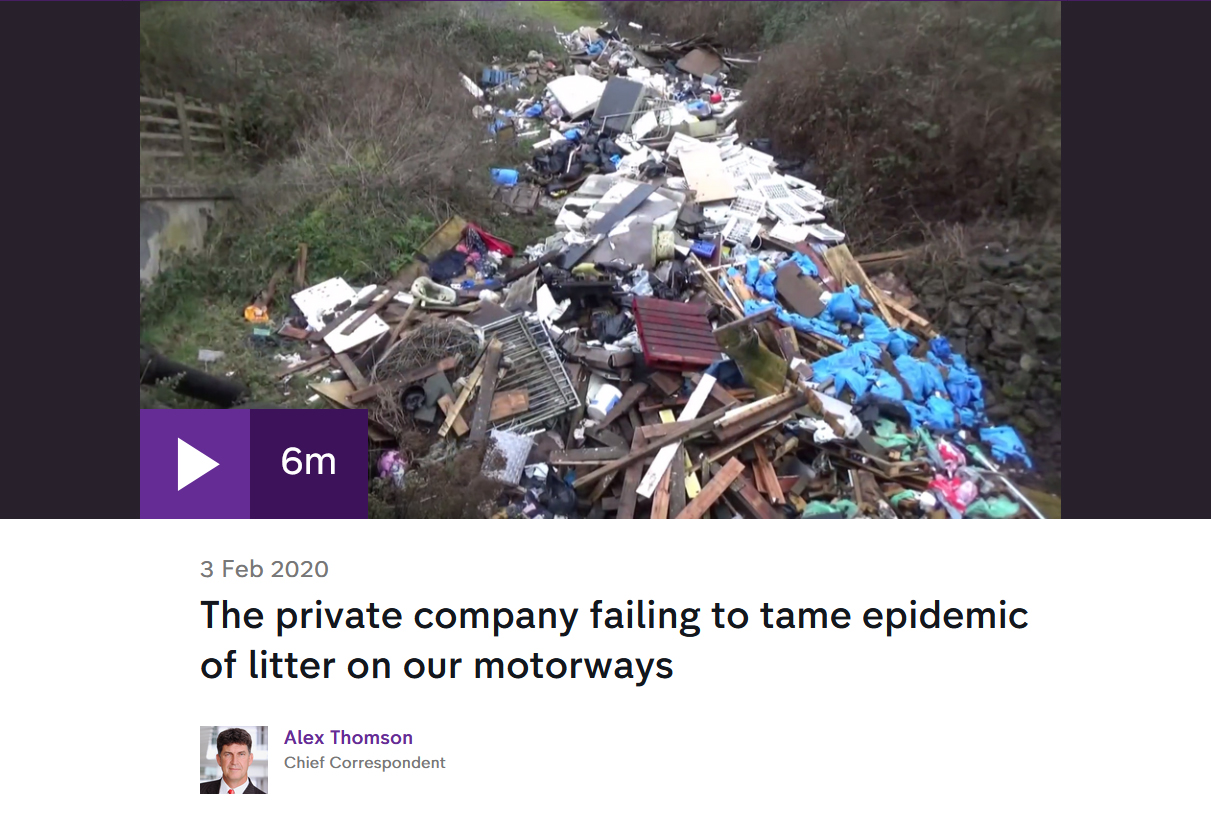
10/02/2020 Channel 4 News Special Report Investigates with Clean Up Britain
Clean Up Britain recently collaborated with Channel 4 to bring this special investigation into Highways England...
10/02/2020Channel 4 News Special Report Investigates with Clean Up Britain
Watch the Channel 4 News Special Report
Clean Up Britain (with excellent research contributed by Peter Silverman of Clean Highways) have collaborated with Channel 4 News to bring this Special Report. Investigation into Highways England has revealed a private contract, £8 Billion of public money and a very littered M25…
Channel 4 News’ Chief Correspondent, Alex Thomson writes : “Instead of pristine stretches of road, Britain’s motorways are being treated as a rubbish dump with verges covered in piles of discarded trash.
Under the 1990 Environmental Protection Act, Highways England are supposed to make sure major roads are kept litter free. So why isn’t Connect Plus, the private firm which has the contract to keep motorways like the M25 spick and span, doing just that?”
-
Anwen Clark 4 years ago
Please could you advise me re increasing litter and fly tipping in my local area? It is all along the verges on a busy country road near our village including in the water filled ditches. I have informed the council who informed me that they close the ‘fast road’ bi annually to clean it up but I know this has not been the case for a few years. They also advised me that the ditches are the responsibility of Natural Resources Wales. They in turn informed me that it is not their responsibility but that of the local authority . I have let the council know with a copy of the email from NRW this evening. What else can I do? I would gladly try and pick it up myself but there are no pavements and its windy in parts. Its wrong to expect anyone to do this! I suggested signage to no avail. Thank you so much for all you do. I hope you can help.
-
Tamsyn Bond 4 years ago
How about a website dedicated to people’s photos of rubbish in verges and beauty spots around the UK?
I found that even on the most inaccessible part of Corfe Castle, Dorset, there were bottles and cans last week. It’s time to raise awareness for an attitude that needs to change.
Comments are closed.
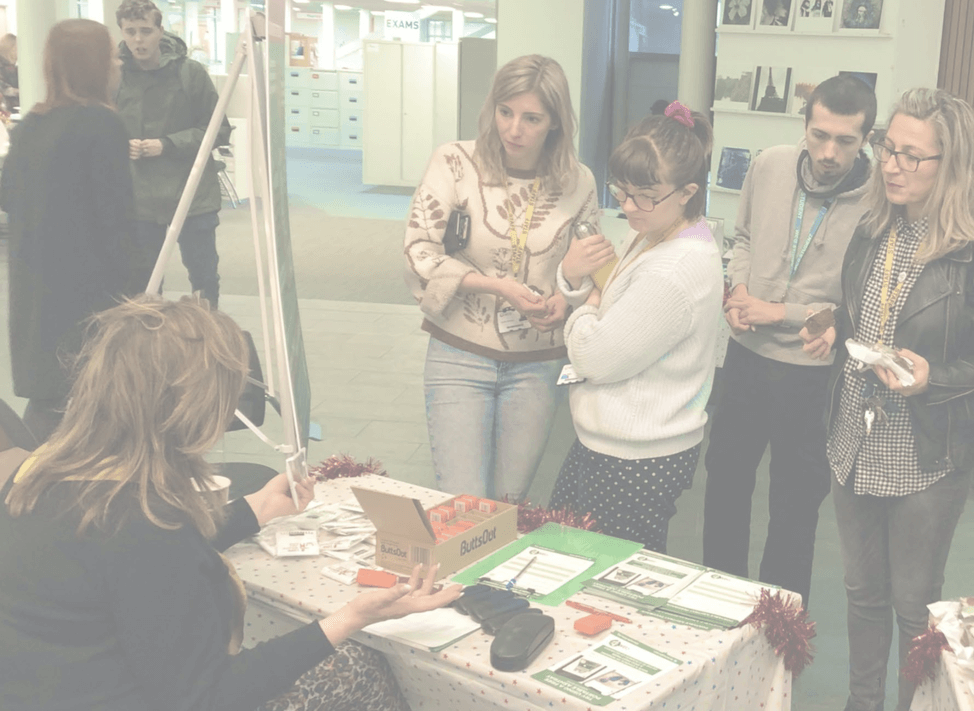

10/02/2020CLEAN UP BRITAIN PORTABLE ASHTRAY RESEARCH IN THE UK
Designing the ‘perfect’ portable ashtray. Why should it matter?
Globally, trillions of cigarette butts are thrown into our environment every day. Most cigarette filters are made from cellulose acetate fibres. Cellulose acetate is a plastic that is slow to degrade. What’s more, cigarette filters leach harmful toxins into the environment.
We think a portable ashtray is one easy solution to ‘on the go’ cigarette litter in the UK. So why aren’t the majority of UK smokers using them?
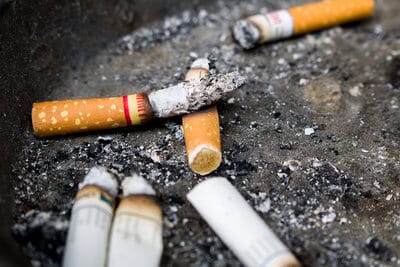
Clean Up Britain, as part of a large scale public survey, has gathered data on how smokers would use a portable ashtray and the ‘optimum’ design to continue or encourage this use. Good design will increase the use of portable ashtrays and reduce cigarette litter.
Over 2019/20 we set out to comprehensively analyse a variety of portable ashtray designs with the help of the general public. As far as Clean Up Britain can establish (and we’ve looked extensively) there has never been a quantitative research survey carried out on the use and design of portable ashtrays in Britain.
To do this we set up a diverse range of Smokers’ Focus Groups to gather qualitative data on what they thought about various designs of ashtray. Participants even had a hand at designing what they felt was their ‘perfect’ portable ashtray. Our Focus Group research made it clear that many factors come into play to create a user friendly design. Some of our findings were quite surprising, such as the audible ‘click when closed’ valued by the majority of participants. Size and minimal/no smell were also considered important.
In our second phase of research we rolled out over 500 hundred portable ashtrays, free, for the general public to trial. A big thank you to local Warwickshire businesses and organisations that supported us with such an ambitious roll out! Once trialled, participants filled out a simple, anonymous survey to provide feedback on the design of portable ashtray they trialled.
Assessing the two pieces of research together (qualitative and quantitative), there are two very strong themes. Firstly, that a majority of smokers are open to the concept of using a portable ashtray (albeit in different circumstances). Secondly, there is very considerable room for design innovation and improvement on the style of portable ashtrays currently on the market.
With this study now concluded Clean Up Britain has produced a 72 page report ‘Portable Ashtrays in the UK – Report on the Quantitative Research, January 2020’
-
laura 5 years ago
I would like to read the 72 page document “Portable Ashtrays in the UK – report on the research – January 2020” please. And what happens next?
Comments are closed.
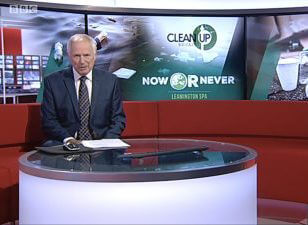
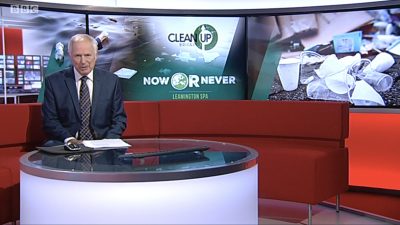
12/03/2019It’s Now or Never. Time to tackle litter, head on.
A few months ago we launched a ground-breaking behavioural change project in Leamington Spa .
During the campaign we want to learn about how to really change littering behaviour. At the same time we’re working on other related issues such as single-use plastic, disposable coffee cups and local businesses impact on the environment.
We’re testing out different ways to encourage people to do the right thing.
We started out with the launch of our shocking ‘Litter Kills’ campaign which highlights the upsetting impact of litter on wildlife and pets. We then cleaned thousands of bits of chewing gum off the high street. Following that we kicked off educational sessions (at both primary and secondary schools). Most recently we launched our Street Activist project pilot.
The Street Activist project answers the question ‘what can I do’ and aims to bring together individuals and groups who want to be part of positive change. The idea is to inspire and enable anyone who wants to do something about litter and the environment. We’ve built the Street Activist ‘Hub’ to help out with ideas, resources and details of local groups and events.
We’ve also joined forces with Plastic Free Leamington & Warwick and awarded our brand new Green Business Recognition to 25 town centre businesses. These cafes and restaurants have committed to managing litter outside their premises and are working hard to reduce their use of throwaway plastics and improve recycling. We’re working hard to bring more on board.
Why Leamington?
Leamington is a fascinating and surprisingly diverse town, bang in the middle of the country:
- It’s got a great mixture of urban and green spaces and waterways.
- The population is diverse.
- There are both very wealthy and very low income areas.
- There’s a significant resident student population.
- Tourists descend, particularly in the summer months.
- There’s a high proportion of local, independent businesses…
- …and our partners Warwick Business School Behavioural Science Group works just around the corner!
It’s going to take time, but we’re on the road to understanding what works – and what doesn’t – when it comes to addressing litter and waste in a single community. We’ll be there over a sustained period so we’ll really get under the skin of the issues.
To find out more about the project, take a look at the website at www.itsnowornever.org.uk.
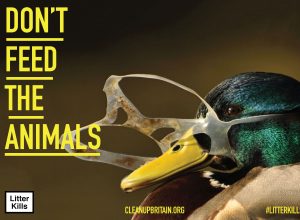
-
Norman Brason 6 years ago
We need an initiative like Tidy Towns in Ireland. The towns and villages are pristine. People in communities get involved.
-
Peter Richards 2 years ago
I clean up our village every morning but it’s not enough.
We must do much much more.
How can I help in the bigger job?
In Japan, litter is unacceptable.
I think the problem is to change British peoples attitude to litter.
How can this be achieved?
I want to help.
Answers please.
Comments are closed.
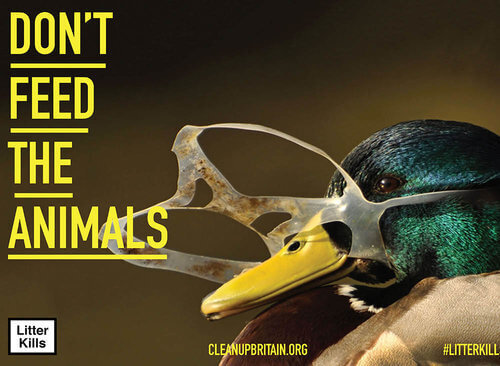
22/04/2018 LITTER KILLS
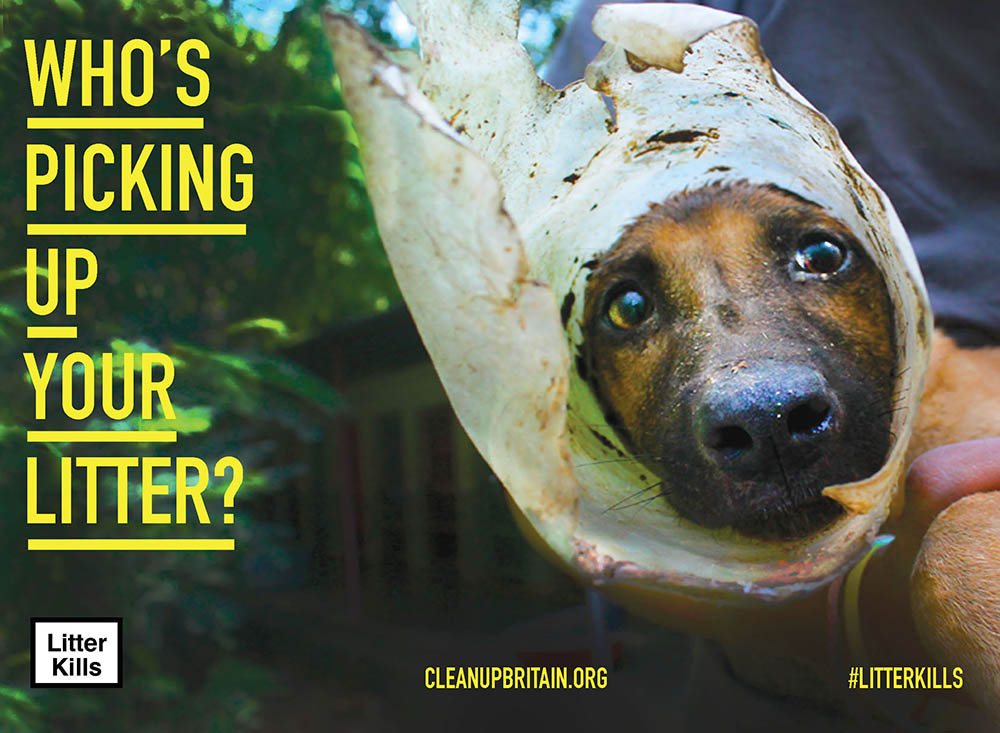
22/04/2018LITTER KILLS
The UK has a serious litter problem. Take a look around you – every village, town, city, beach and roadside is blighted with the lazy leftovers of our daily lives.
We’ve been wrestling hard with how to properly ignite the conversation about litter and the damage it does.
In particular, we need to get to young women and men, age 16-30, who don’t even think about litter. This age group, while outwardly professing a love of the planet, recycling and other green issues, over-indexes on littering compared to other age groups.
Its been ages since a national anti-litter campaign ran which changed littering behaviours, the topic of littering gets no airtime with this audience, and any wider efforts to prompt thinking and behaviour change has been largely ineffective.
Litter doesn’t really figure on their radar. Yet.
We had seen the RSPCA stats – they get 5000 calls a year about animals injured by litter. Instinctively, we knew that this must be the tip of the iceberg.
We also knew, from previous research, that talking about hurt and dead animals was one of the only ways to ignite the conversation about litter with our target audience.
And so we began looking hard at the impacts of litter on animals, and with help of the RSPCA, the British Veterinary Association and the pet charity, Blue Cross, we built the bigger, shocking picture. Our campaign ‘Litter Kills’ was born.
We know that the images are shocking – that’s the point. We need to give people a reason to react strongly to seeing others litter, and make those who do think twice. We have to shift attitudes and behaviour.
We’re supposedly a nation of pet and animal lovers. British households in total host 8.5m dogs and 8m cats. Millions of us care about wildlife and enjoy seeing wild animals where we live, work and play.
Yet our littering habit affects thousands and thousands of animals in a very bad, sometimes fatal, way.
The images we have used are real. In fact, there are countless more we could have chosen from.
If these aren’t enough to convince you, here are just a few real life case studies from our partners:
From Mark Bossley, Chief Veterinary Surgeon at Blue Cross:
”One 17 year old poodle was admitted with a bone from a discarded takeaway lodged in its oesophagus. It needed a general anaesthetic and an endoscopy to remove it. If the owner hadn’t seen it happen and brought the dog straight to us then we might not have been able to save it”
“Chewing gum and other food products containing sweeteners or mouldy food is toxic to pets. There has been a recent case of a dog admitted after eating chewing gum and being poisoned.”
John Fishwick, President, British Veterinary Association, said:
“Littering can be a definite problem for pets, and vets frequently see its unfortunate impact on animals in the form of cuts to paw pads from broken glass or metal cans and illness from scavenging discarded food, included cooked bones. Pets can also fall sick from eating food wrappers or other packaging that has been carelessly thrown away.”
And from the RSPCA:
“A recent case involved a duck with a plastic ring trapped in his bill and around the back of his head. It must have been extremely painful. Unfortunately we had to put it to sleep at the scene to prevent further suffering.
It’s really shocking and sad to see wildlife suffer in this way, when it could have been easily preventable. This is why we always ask people to please dispose of their rubbish responsibly.”
So there can be no doubt.
Litter Kills.
It’s time to act.
Litter Kills has been launched as part of our groundbreaking ‘Now or Never’ campaign which has just kicked off in Leamington Spa.
-
Cécile Nurit 6 years ago
Dispose of one’s rubbish… isn’t enough : those who are aware of the rubbish problem are not the ones who litter the most… obviously.
So maybe we should all start picking up ANY litter we see, not just, selfishly, “ours”.
Take a plastic bag in your handbag, in your coat pocket, in your jeans back pocket, each time you go out for a walk. I promise you, you will fill it up sooner than you think ! And then you will regret you haven’t brought a second bag with you !Also, on your way to school, to home, on your familiar ways to somewhere, when you know there is a bin on your way, pick up any litter you see and put it back where it belongs : the BIN !
Before I used to moan about the sate of the streets and thought people were paid to do this job and that it wasn’t my responsibility… and then I became a mum and wondered what message I wanted to transmit to my children… moan ? or act ?
So I started acting. It’s the first times that are hard, you feel everyone around is watching you strangely…
I’ve been doing this for years now, at first quite shyly (and now I wonder why ?!) and have always met people with a kind look at this not-yet-usual behaviour, a lot of encouragements too, compliments, from pleasantly surprised people.
I live in a village of 3000 souls and after windy days this place is a real open-air bin ! I realised it’s not only because people throw away their litter, it’s also the shape of the public bins (without roof) that can make things worse, so it’s not to someone in particular to pick it up… it’s everyone’s job in the end, isn’t it ?
And what a good example to give to our young ones !!! If they see us do it, they want to do it too.
I say to my child : “every litter we pick up, we save an animal. Gee, we saved a lot of animals today…”It’s as simple as that.
Thank you for reading me till the end !So… when do you start?
-
What do our kids say about the littering of our streets, hedgerows and greenspaces? | feet1st 4 years ago
[…] Resource used with permission of https://cleanupbritain.org/litter_kills/ […]
-
David Armstrong 3 years ago
We Have a dirty litter strewning numerous near bone idle scruffy ignorant nation. Today’s generation have turned great britain into a near open tip.
Comments are closed.
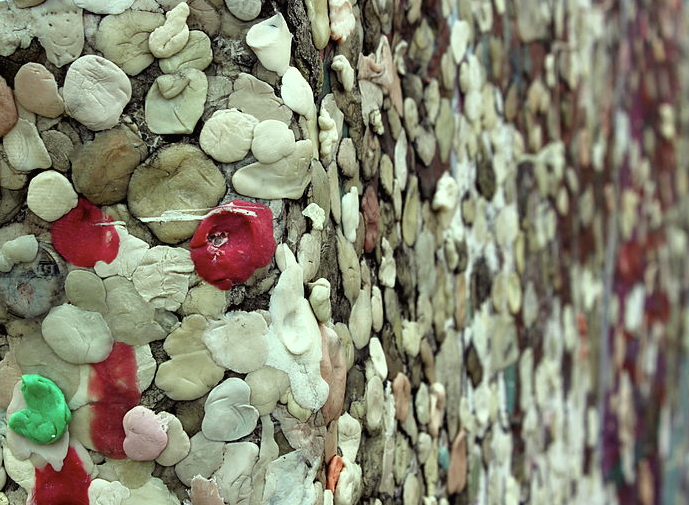

02/03/2018Chewing Gum Tax – why we’re campaigning to hold producers to account
We’ve partnered with the Local Government Association (LGA) to table a cross party motion in Parliament, along with a petition asking government to hold gum producers accountable for the huge costs of cleaning chewing gum off streets across our country.
Our local councils currently stump up a total of £60 million a year removing an estimated two million pieces of gum from pavements – money which is desperately needed elsewhere. We’d much rather see it spent on pressing issues such as social care and housing, homelessness and other vital, underfunded community services.
Chewing Gum never biodegrades. It’s hard to find out exactly what’s in most gum bases as the recipes tend to be closely guarded secrets, though most sources mention polymers, the same type of material used to make plastics and rubbers. This goes some way to explaining why this grim, sticky source of pollution needs specialist equipment, and costs a fortune, to remove.
Read the full Daily Telegraph article here.
To sign the petition click here.
*We’re interested to learn more about how synthetic gum bases are made – could they be classed as a single-use plastic? If you can help us understand more please get in touch via the Contact Us form. Thank you!
-
[…] Up Britain and the Local Government Association (LGA) both support a tax on gum producers. A cross-party motion was tabled in Parliament this February calling on the Government to tax […]
-
Frank Latham 4 years ago
Not before time. Ban the stuff altogether like Singapore.
-
Heather Foster 3 years ago
I’ve been contacting some of the motorway services companies as they are pretty disgusting. Success with Welcome Break who are taking real action. I also started a petition which would deter littering from vehicles although I have only got to 6800 signatures so far
https://petition.parliament.uk/petitions/582331
We need to work together with the councils and highways so they enforce the laws we already have
Comments are closed.
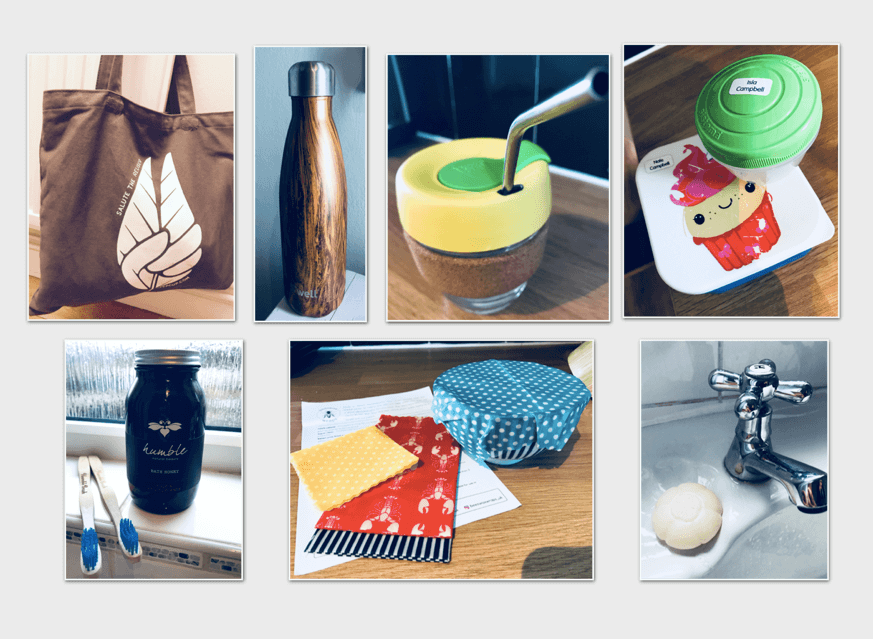
25/02/2018 Plastic – can you use less in your life?

25/02/2018Plastic – can you use less in your life?
We’ve been doing lots of thinking about single-use plastic lately. It’s always been a big part of the litter problem – in fact, the UK’s most littered item – cigarette butts – contain thousands of little particles of plastic.
There are more worrying facts out there, many of which you might have read. Here’s a few of the most attention-grabbing:
- Plastic has only been around for 60-70 years. Science Magazine estimates that 8.3bn tonnes of plastic has been produced in that time.
- Of this, 6.3bn tonnes of plastic is now waste – a majority of which (some 79 per cent) is in landfill or our natural environment.
- It’s estimate that plastic will outweigh fish in the sea by 2050.
- Drinks bottles are a big part of the problem – 480 bn plastic bottles were sold globally in 2016. It’s estimated that us Brits get through 150 on average each every year.
- In a marine environment, plastic bottles slowly break down into smaller and smaller pieces (called micro plastics). Ultimately, these microscopic pieces never disappear.
So the team at Clean Up Britain have been looking at simple ways we can all get started on reducing single-use plastic in our day-to-day lives. Here are the things we’re doing so far:
- Always carrying reusable bags for our shopping
- Taking reusable cups for our take-out hot drinks. We love KeepCups which are stylish, ultimately recyclable and don’t leak on the commute! We’re also finding lots of coffee shops give discounts when we use them, win-win.
- Always asking for drinks without plastic straws (we think our G & T tastes better that way too…)
- Carrying refillable water bottles and drinking good old tap water – read about the Refill scheme here which is making it easier to fill up your bottle when out and about.
- Shunning pump-bottle soap for bars of the stuff – there are some gorgeous smelling ones out there, really quite satisfying to use.
- Shifting over to bamboo toothbrushes which are ultimately biodegradable.
- Using Beeswax Wraps instead of cling film in the kitchen – so clever – naturally anti-bacterial, completely natural and reusable, again and again.
- Choosing glass packaging for beauty and bath products where possible – it’s getting easier to make non-plastic choices which are fabulous to use as well as kind to the environment.
In some cases we’ve found we’re saving money in the longer term (discounts on coffees, not buying bottles water, not paying for plastic bags at the supermarket) and it’s much easier than we’d thought to make positive and satisfying changes. Why not give some of the ideas above a go yourself?
Stats sources – The Telegraph, Surfers Against Sewage
other articles
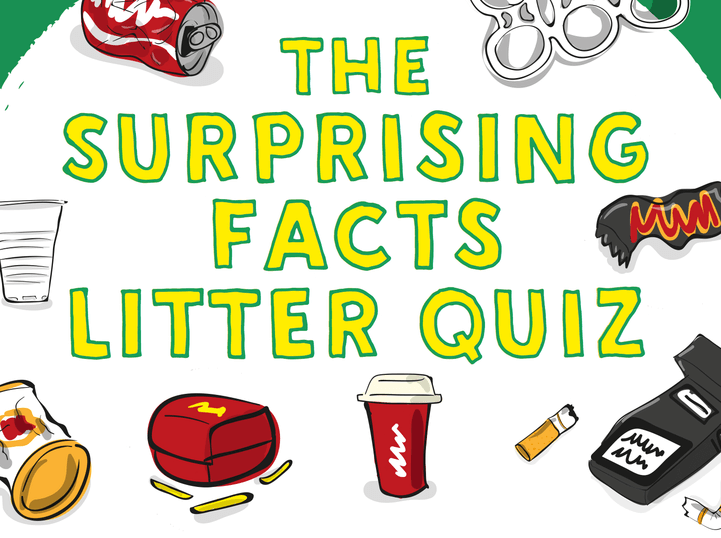
17/10/2017 Our Free Educational Resources for ages 8-11
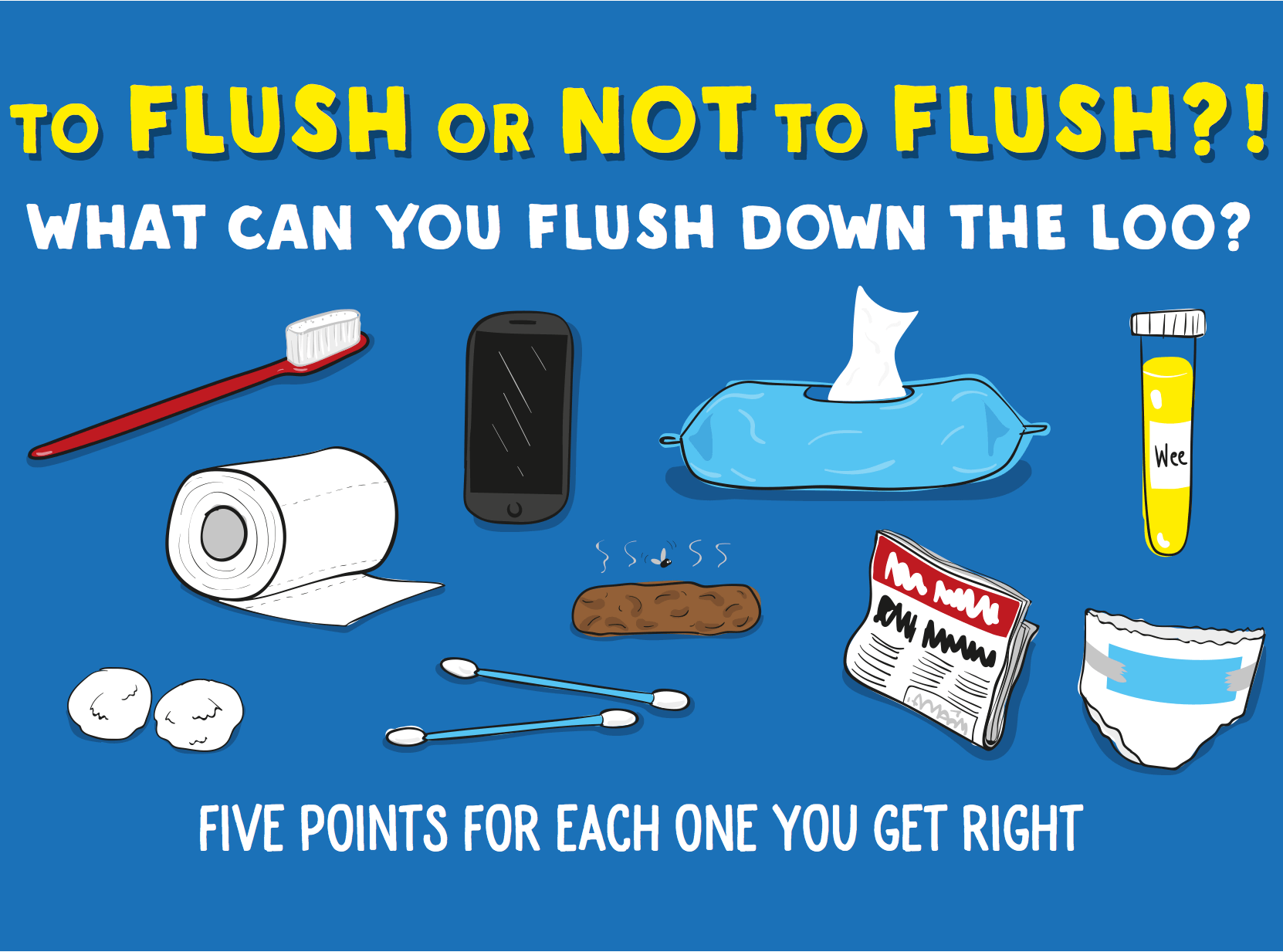
17/10/2017Our Free Educational Resources for ages 8-11
We’ve designed this educational pack with the help of school kids and a cubs pack, so teachers and community group leaders can deliver a fun and engaging session on the environmental impacts of litter and waste very easily and with little prep.
The contents have been successfully tried and tested with KS2 (ages 8-11) and help them really understand:
- Why dropping litter is bad for our environment, wildlife and communities
- Why it’s important to think carefully about balloon releases and how we use certain ‘single use’ plastic items
- What we shouldn’t flush down the loo and why!
The resources can easily be delivered in an hour. If you want to, sessions can be made longer by spending more time discussing the facts, designing anti-litter posters or getting out and doing a litter pick.
The resources also include a pledge certificate and some suggestions for the promises kids can make having completed the learning. We’ve given some ideas such as ‘I promise never to drop litter’, ‘I won’t release helium balloons’ or ‘I’ll buy fewer drinks in plastic bottles’. We encourage kids to make these pledges with support of their family to get the discussion going at home too.
We’re always keen to hear your feedback and have now started work on resources for use with older age groups. Watch this space.
Download the leader notes and resources pack using the links below:
https://cleanupbritain.org/wp-content/uploads/2017/10/Clean-Up-Britain-Litter-Quiz.pdf
https://cleanupbritain.org/wp-content/uploads/2017/10/CLUB-Litter-Quiz-Teacher-Notes.pdf
-
Patrick Gibb 5 years ago
What about Dental Floss. A lot of people do flush it,
-
Gary Sando 2 years ago
What I can not understand is why there is not a prolonged campaign on TV as there was before when we had keep Britain tidy there needs to be more education focusing on the young that chucking rubbish on the pavement roads fields is wrong I am dog walker and I walk country lanes I pick what I can but why do people do it we need a national campaign asap
-
Paul Acheson 2 years ago
You are spot on, a national full on TV advertising campaign need to be funded directly from the environment budget, perhaps from DEFRA? The ‘environment’ needs to to be on the national curriculum, I am embarrased by our Dirty man of Europe image, I just read this online at Euronews! ‘Welcome to a filthy, littered dump called Britain”
-
Comments are closed.
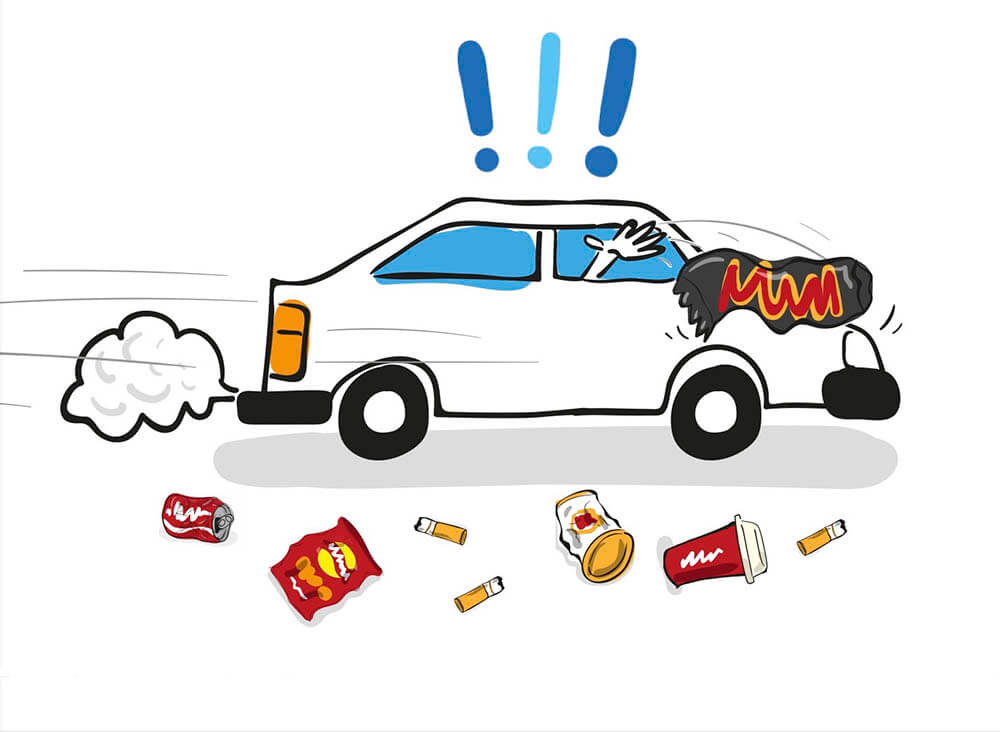

28/09/2017FUNNEL BINS, YOUR FEEDBACK AND THE BIGGER PICTURE
You may have seen that we’ve recently commented on the Highways England Funnel Bin project in the press.
We’ve had some passionate feedback – both supporting and challenging our comments. Thank you to everyone who has fed back – we appreciate the time you’ve taken to do so.
We thought we’d write about the bigger picture. It’s almost impossible to present important detail in a few minutes of radio show or a TV clip which has been thoroughly edited!
At Clean Up Britain we completely agree that more bins are generally a good thing when the right type of bins are put in the right places and emptied often enough so they don’t overflow.
That said, we’ve been up to our eyeballs in litter for a few years now and, unsurprisingly, it’s a complex topic for which the solutions are not straightforward.
Through our work and lobbying we’ve learnt that to properly address our growing litter problem a multi-pronged, long-term approach is needed. A combination of campaigning and communications, education, innovation, consistent enforcement and the right bins in the right places.
In addition, and crucially, we have to challenge the ‘social norm’ that it’s ok to litter. There’s loads of research on this particular topic. Warwick Business School did a nice summary:
‘One way social proof manifests itself is through observing the results of past behaviour. If there is a lot of litter on the ground it means that littering is a normal and accepted behaviour. Therefore, environments that are clean will nudge people to use bins, whereas environments that are unclean will nudge them to litter more’*
Our friend Peter Silverman of Clean Highways has been campaigning tirelessly to motivate Highways England who he asserts fail to comply with their statutory duty to keep their land clear of litter and refuse. Do have a look at his website to see the extent of his challenge and his work.
We also had a couple of practical concerns – so many people who buy food from services eat in transit, so extra bins aren’t necessarily capturing the rubbish that ultimately ends up on verges away from rest stops. Also, some of us are a pretty bad aim – which potentially means a litter problem in itself is created as people miss and the wind does its job.
Of course we support all positive action to address litter and agree that the problem lies largely with the person who drops it. However, a balance needs to be struck in public discussion on the topic and the bigger picture acknowledged. What we really need is long term plans, investment and commitment to address the fact that motorway verges the length and breadth of Britain are strewn with litter.
We promise to keep campaigning and lobbying for a holistic approach to address our litter problem. We’re a member of the government’s Litter Advisory Group and continue to meet with civil servants, parliamentarians and Ministers in an effort to help drive long-term change.
If you’re interested you can read the Litter Strategy for England here.
We’ve also embarked on a further program of work to practically address some of the needs we see as priority, which we hope to be able to go public on early next year. As we progress feel free to hold us to account, ask us questions, give us challenges. We will always listen and respond.
You can also help:
- Simply pick up a piece of litter every day. When people see you doing it, stand proud and keep going. What you’re doing is helping create a new social norm. Research shows that if people see others picking up litter they are less likely to drop it themselves.
- Make a fuss on social media if you can. Follow, share or retweet organisations who are on the same page. We are particular fans of the following Twitter accounts: @2minutebeachclean @zilchUK @cleanhighways @littergram
- Contact us for a copy of our straightforward and fun KS2 educational resources developed with, and aimed at 8-11 year olds. Suitable for schools and community groups who want to spend an hour on the topic and inspire their kids to do the right thing.
- Start a dialogue with the council. If litter starts to build up things will only get worse. As we’ve discussed, clean, well loved spaces are more likely to stay that way and the reverse is also true. Encouraging your local council to maintain clean spaces helps get the battle won. Littergram can help you with this.
- Lobby the government. Contact us for some guidance which highlights what we feel are the key needs and issues not fully addressed in the Litter Strategy for England. Every voice helps. Copy us in so we can keep a track of who else is getting involved.
Check back on the website where we will keep our news updated and publish more details of how our supporters can help as time goes on.
Many thanks, the team at Clean Up Britain.
*Dur & Vollaard, 2013; Finnie, 1973; Geller, Witmer, & Tuso, 1977; Krauss, Freedman, & Whitcup, 1978; Reiter & Samfuel, 1980
other articles


17/09/2017Starbucks and Pentatonic create furniture from post-consumer waste
We’re really pleased to be backing another positive step from Starbucks as it further commits to reducing impact on the environment.
Starbucks has announced that they are to partner with Pentatonic in an innovative design partnership to create furniture, tiles and textiles out of store waste.
Pentatonic is a newly launched furniture company whose products are made using post-consumer waste such as plastic bottles, plastic cups and paper straws. As part of Starbucks plan to decrease its environmental footprint, this collaboration focuses on store design and involves a new sustainable take on the iconic ‘Bean Chair’, currently found in stores nationwide. The partnership is just one of several environmental design projects to be unveiled this September by Pentatonic in its pop-up store during the London Design Festival.
Jaime Hall, Co-Founder of Pentatonic said:
“Partnering with Starbucks to build furniture and materials out of their own waste is a major demonstration of how scale can be a force for good. By taking the iconic Bean Chair design and re-engineering it using trash, it further illustrates the unlimited application possibilities of post-consumer waste. With Pentatonic’s technology and Starbucks commitment to a greener future, the potential impact of our partnership is truly significant for the planet.”
To launch the partnership, Pentatonic and Starbucks have also collaborated on a pop-up bar constructed entirely from its own waste materials. The bar will reside within Pentatonic’s Shoreditch pop-up and will be open from the 15 September to 12 October serving Nitro Cold Brew and Chemex brewed coffee. Excitingly all proceeds will be donated to Clean up Britain to enable us to continue our campaigning and embark on some fantastic new projects. You can visit the project at The Old Synagogue, 2 Chance Street (entrance on Whitby Street) London E1 6JT.
Opening dates/times:
September 15-October 12, 12.00-19.00 daily
other articles
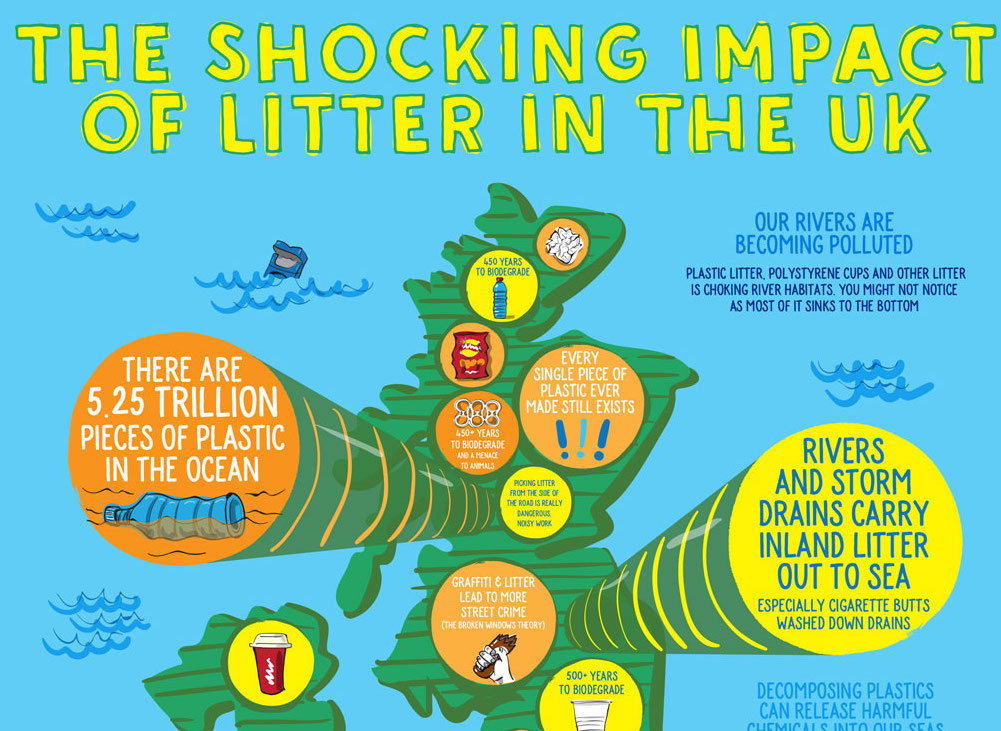

22/06/2017Impacts of litter – a different way of looking at it…
We wanted to find a different to bring to life the negative impacts litter can have – something attention-grabbing, colourful and really informative. Something we hope you will want to look at, share and discuss.
So here it is! Designed by the superb illustrator Dan The Scribbler we’re finding it particularly useful in schools, the bigger the print out the better!
Please feel free to download (using the link below), print and share.
other articles
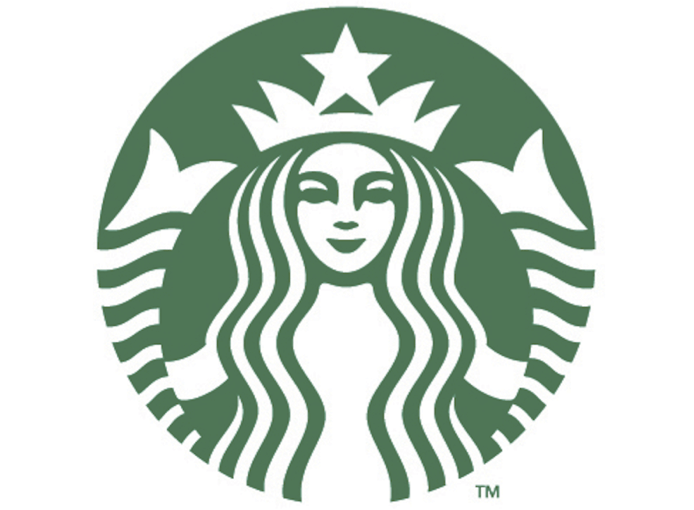

22/04/2017STARBUCKS CHAMPIONS REUSABLE CUPS ON EARTH DAY
We’re proud to officially support Starbucks who will be giving away 18,500 reusable cups on Earth Day – 22nd April 2017.
As our supporters will know, we strongly believe in long-term sustainable change. Every day millions of paper cups are used for just minutes before going straight to landfill or becoming litter. They’re manufactured from virgin paper pulp and less than 1% of the estimated 2.5 billion we get through every year are currently recycled.
The reusable cup giveaway is launched in the same week as a new awareness message on cup sleeves ‘Reuse to Reduce’ and accompanies the long-standing 25p discount offered to customers using a reusable cup – an incentive Starbucks has had in place for over a decade.
Testing different approaches to encourage and enable people to use reusable cups is an extremely positive step and we are proud to support efforts to promote reusable cups, and understand what prompts people to make the switch.
It won’t be easy – and will take time – but it’s great to see one of the world’s biggest coffee companies seeking solutions to this challenge.
Simon Redfern, vice president communications for Starbucks Europe, Middle East and Africa said;
“With today’s giveaway we are inviting our customers to try to create a new cup habit and help reduce our impact on the environment. We are continuing our efforts with industry partners to find a sustainable and safe long term solution.”
The reusable cups will be given away in participating stores across Great Britain. To find your nearest store in England, Scotland and Wales please visit: https://www.starbucks.co.uk/store-locator – available whilst stocks last.
other articles

21/04/2017 JOHN READ WRITES FOR THE TIMES ON LITTER

21/04/2017JOHN READ WRITES FOR THE TIMES ON LITTER
‘Westminster . . . we have a problem.” I’m not referring to Brexit negotiations or the pressures on the NHS. It is something seemingly much more mundane, but corrosive to communities all over the country: the deluge of litter and fly-tipping.
When you’re walking or driving this week take extra notice of your surroundings — roadside verges, pavements, parks, high streets. Clean Up Britain’s theory is that people have become so used to seeinglitter and waste that they are now inured to it.
However, councils spend almost £1 billion a year cleaning it up — an appalling waste of taxpayers’ money that could be far better spent on social services, playgrounds and the like.
Today, for the first time, the government has published a national litter strategy. It doesn’t go far enough. Fines for drivers and passengers who throw litter out of vehicles should be at least £200 — the same amount that has recently been introduced for drivers caught using their mobile phones.
Lord Gardiner of Kimble, the “litter minister”, needs to have the courage to do much more to tackle the problem. If he does he will be applauded by the vast majority of citizens who are sick of having their local communities environmentally desecrated. If not, he will deserve contempt.
The problem was well summed-up by Sean Lawson, director of environmental services at Rugby borough council, when giving evidence in parliament: “We often do not associate [litter] widely enough in terms of the impact it has on social cohesion and the economic vitality of areas. We think ‘It’s just litter’. We really do need to shift how we think about litter.” He’s absolutely right.
Apart from making our green and pleasant land a permanent eyesore, litter costs us a fortune to clean up, injures and kills animals that ingest it and discourages investment and tourism. There is a growing body of evidence that it causes depression.
The only sustainable answer to the problem is long-term behavioural change. Much like drink-driving, we need to make littering socially unacceptable. If the government’s promise to leave this land in a better environmental state than it inherited is to mean anything then its national litter strategy cannot turn out to be a damp squib.
Read the original article here.
other articles
-
HM 2 years ago
I fully agree. Increase surveillance increase fines, educate children and their parents and STOP LITTERING.
Comments are closed.
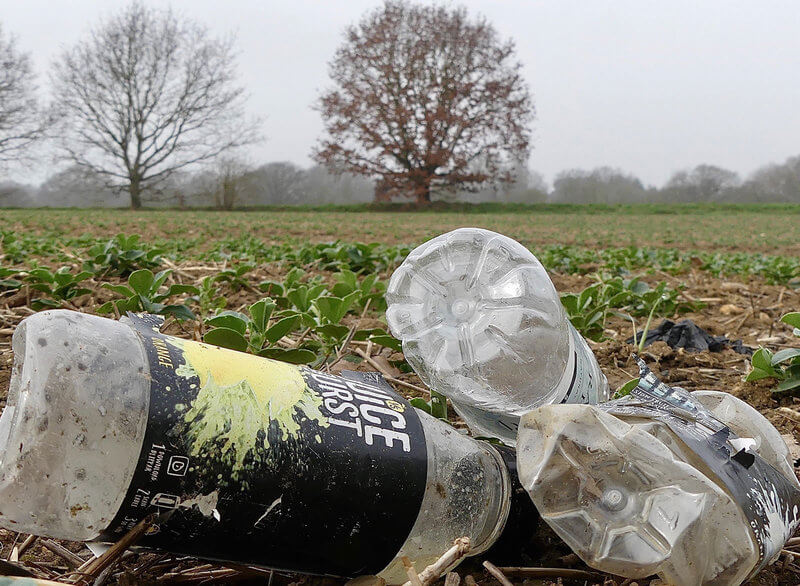

09/04/2017A fantastic day as the National Litter Strategy is published!
We’re extremely pleased that the government’s first National Litter Strategy has been published.
Having been working on the National Litter Advisory Group we’re confident that the strategy will create a strong platform from which positive cultural changes can be made.
The strategy states:
‘Our ambition is to be the first generation to leave the natural environment of England in a better state than it found it. We are clear that we must act now to clean up the country and change our culture so that it is no longer acceptable to drop litter.’
There’s a lot to do – pleasingly the strategy is pretty comprehensive. You can read it here.
We’re particularly pleased that, amongst other commitments, the strategy promises to:
– Deliver a world class national anti‐littering campaign
– Review the case for increasing the fixed penalties for littering (and related offences)
– Regulate to allow English councils to fine the keeper of a vehicle from which litter is thrown
– Facilitate strong and consistent anti‐litter education
– Empower local communities to channel their passion for their local environment into positive action
– Recognise and reward the contribution of volunteers to tackling litter
– Support the packaging industry in improving product and packaging design to deter littering
– Support national clear‐up days
And so the important first step is taken. We’re determined that the strategy will set the framework for fundamental change – change which will hugely benefit our communities, environment and wildlife and save us taxpayers money which will be better spent where really needed.
Watch this space for our updates as the work really begins.
In the meantime, if you want to take action yourself, see our blog post ‘How you can help’.
other articles
-
Doug Harris 4 years ago
4 years on and has this really had any effect? I think not … as typically Government makes new laws, carries out feasibility studies and pontificates in Parliament, but does little actual physical application on the ground. Meanwhile, the un-caring malaise within some elements of the public becomes deeper entrenched.
Comments are closed.
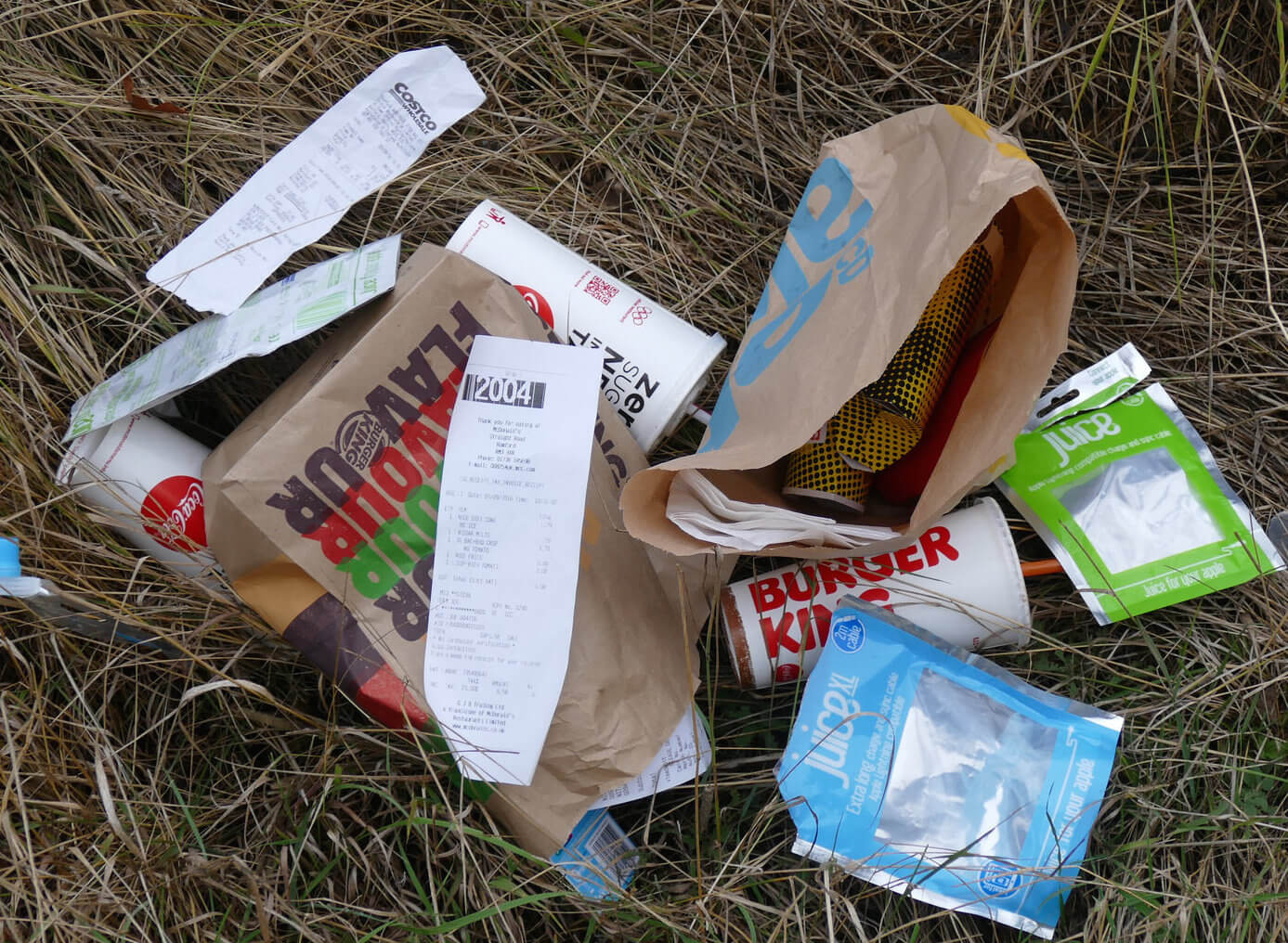

30/03/2017How you can help and be part of the litter solution
Driving change is only something we can do with the help and support of people like you. Any action you take to raise awareness and help tackle the issue is valuable. Who knows, you might even become a fully obsessed litter activist!
Below we’ve listed some ways you can help and get involved. Drop us a line and let us know how you get on – we’d love to hear from you.
Simply pick up a bit of litter every day*
When people see you doing it, stand proud and keep going. What you’re doing is helping to create a new social norm. Research shows that if people see others picking up litter they are less likely to drop it themselves (and may even start picking it up).
Make a stand on social media
Like us on Facebook and share posts which you feel strongly about.
Follow and share on Twitter: @cleanupbritain
Download Littergram and help us build a litter map of Britain. If you can, post to social media to drive even more awareness of the problem.
Talk about the issue with your friends, family, local school or community group
Raising awareness is a great way to start influencing change. Check out our hideous litter stats blog post which should give you plenty to discuss……!
Join or start a local litter pick
There’s information and support at http://www.litteraction.org.uk where you’ll find everything you need to know and connect with existing groups in your area.
Here you can also quickly learn about how to use a Litter Abatement Order to force local litter hotspots to be addressed. Really powerful stuff.
Start a dialogue with the council
If litter starts to build up things will only get worse. It’s well known that clean, well loved spaces are more likely to stay that way. The reverse is also true. Encouraging your local council to maintain clean spaces helps get the battle won. Littergram can help you with this! Don’t give up!
And if you’re really bonkers ask us about www.cleanuphitchin.co.uk – a community project run by a member of the Clean Up Britain team….
Finally, keep checking back on the Clean Up Britain website as we’re currently developing some fun, easy-to-deliver content for use in schools.
*It goes without saying that your health and safety is top priority so be careful of anything sharp, particularly dirty or otherwise grim which might pose a hazard to your health.
other articles
-
Nigel Dunnill 8 years ago
Just watched a BBC news article about litter and raising fines. I totally agree and may I suggest tackling the Post Office first. Their operatives drop rubber bands all over our estate. I pick them up and post them back. Good mind to create a rope and wrap it round the post office !!!
-
Carey Moon 7 years ago
I would like a poster that I could print out and put in my window and in my car – saying somehting like ‘Keep Britain Beautiful – don’t drop litter!’
-
Jeffrey Schofield 5 years ago
Yeah the same, like keep Britain tidy stickers
-
stephen Parfitt 4 years ago
Much larger bins required in many more roadside locations.Must be regularly emptied,once a week is no good.McDonald etc MUST clear their car park bins regularly they are NOT doing this.Also approach roads to their restaurants must be checked by Council and fines given to the Company for dirty roads
Comments are closed.
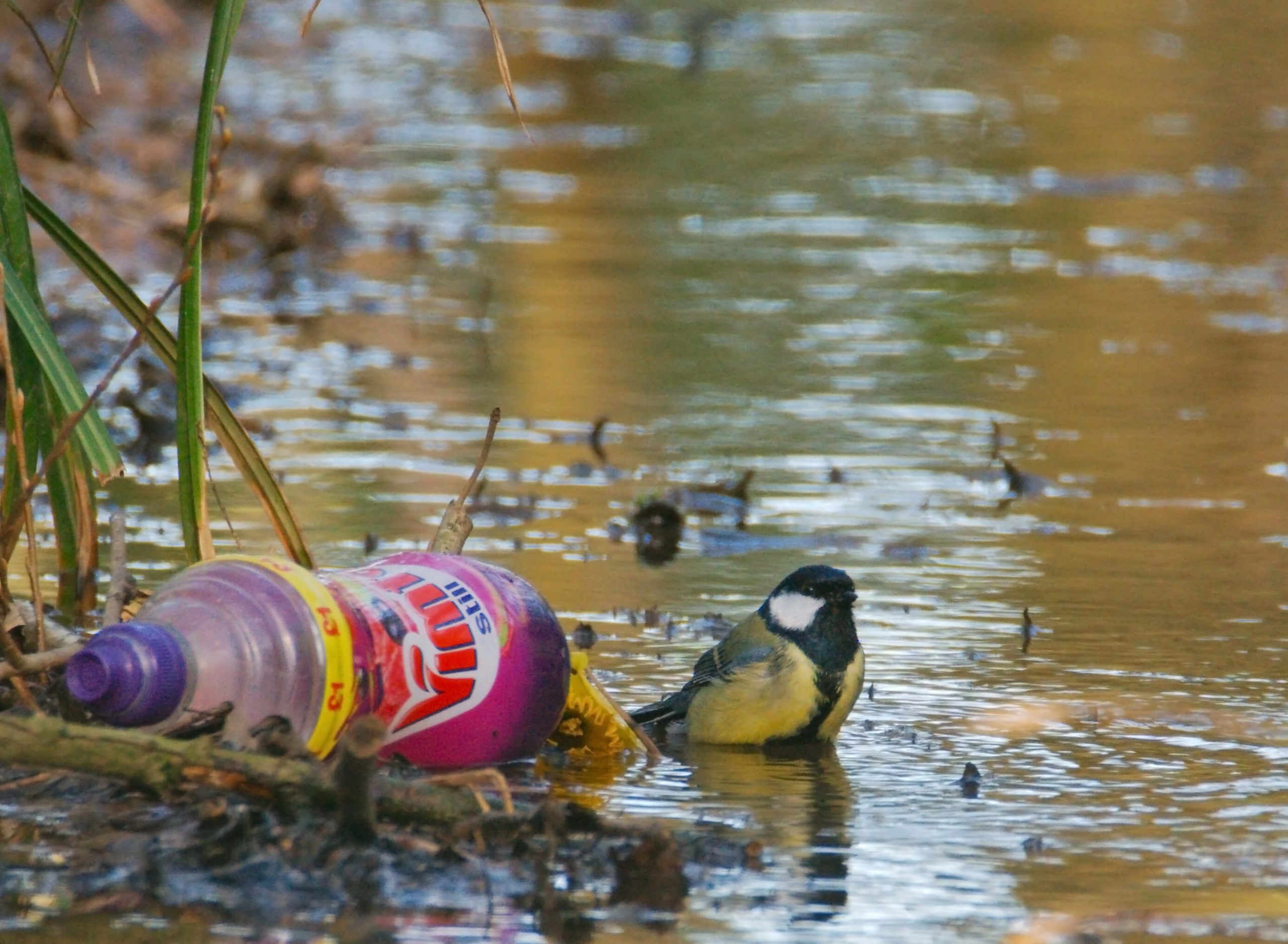
30/03/2017 Hideous litter stats tell a depressing story

30/03/2017Hideous litter stats tell a depressing story
Litter facts and stats – here’s some of the most insightful and depressing we’ve come across. Feel free to share!
In the UK, levels of litter have increased 500% in the last 50 years (1).
It costs the UK £1bn to clear litter EVERY YEAR (2). Money which could be spent on things to really benefit society. Think of the good it could do in our struggling NHS…
A poor-quality local environment can also have wider impacts on public health, including mental health problems such as anxiety and depression. On the flip side, living near good quality, accessible green space can improve mental and physical health (3).
Wildlife suffers the consequences, as do our pets. The RSPCA receive over 7,000 phone calls a year about animals who have eaten or been injured by litter (4). They think that the real number is much higher as most owners go straight to vets and many wild animals who suffer aren’t found.
Plastics, polystyrene cups and discarded packaging are choking river habitats but tend to be hidden at the bottom of the water so go unnoticed. Decomposing plastic can release toxic chemicals which are then passed through the food chain.
Rivers and storm drains carry inland litter out to sea. There are 5.25 trillion pieces of plastic debris in the ocean and 2,500 items of rubbish for every kilometre on our beaches (5).
An estimated eight million tonnes of plastic waste is added to the oceans every year and most plastic never biodegrades. It breaks down into smaller pieces known as micro-plastics. Large pieces can trap animals and smaller pieces are often eaten (6).
Litter thrown from cars causes accidents when people swerve to miss something flying towards their car, run over or hit something in the road. It’s estimated that the cost of accidents caused by litter in the UK is in the region of £8m (7).
Picking litter from the side of the road is a really dangerous job – people have been killed doing it. No-one would have to take the risk if other’s simply took their rubbish home. Some councils deem it too dangerous to clear verges on certain roads so it’s just left to build up.
Sources: 1 & 2: Local Government Association. 3: Ellway et al, 2009. 4: RSPCA. 5: Surfers Against Sewage. 6: University of California. 7: Highways England.
other articles


24/03/2017Fly-tipping – don’t be unwittingly responsible
Most of us all have a load of old stuff we need to get rid of and it’s not always easy to get to the tip. Paying someone else to take it away for you is often a nice solution, especially when you lead a busy life or don’t have a huge car boot…
However, as fly tipping becomes an increasing problem it’s often down to us regular folks who, unwittingly, pay rogue traders to ‘dispose’ of our waste.
It’s simple to take these idiots out of the picture – a quick check to see if they have a waste carrier permit is all it takes. Doubly important as, by law, you are responsible for getting your waste disposed of legally and can face a huge fine if you don’t.
IT’S REALLY EASY TO CHECK – you can either:
Call the Environment Agency and ask – 03708 506 506 (cost is the same as a call to a landline number and if you have inclusive minutes with your phone it’s free to call).
Or check on-line here.
You’ll need the person or business name or registration number – if they are legitimate they should be very happy to give you both.
So:
- Ask for their waste carrier permit number
- Check it online or by calling 03708 506 506
- Ask for a transfer notice or receipt when they pick up your waste
Job done!
other articles
-
J Barrett 4 years ago
I have read the article above. Sadly there are many rogues out there. Just because someone has a permit it does not mean they are law abiding. Some are very willing to take your money and not bother to dispose of the rubbish lawfully. I do feel it would make sense to have system whereby one can be notified by the local council that your rubbish has arrived at the tip. We live in a world of tech. As an example the NHS let us know when our appointments are by text. The onus must be put back onto the companies that offer this service and take our money. It should be made LAW that we can only use a licensed company, many do not bother to check this information. The customer should be given details of the company and permit number, and vehicle registration at the door. They should have to give their contact details to the driver, whereby he passes this onto the council when he arrives and goes on the weighing scales. All costs for a text or email from the council could be added in the cost. I am sure this would be cheaper that clearing all the mess left in our countryside.
Comments are closed.
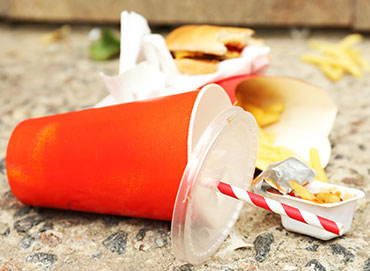

20/02/2017Behavioural science can help tackle the UK’s litter epidemic
The costs of litter are significant and varied. The annual cost of picking up litter across the UK is close to £1 billion , eighty-one percent of British people say that seeing litter on the streets makes them frustrated and angry and spending time in places that appear uncared for may result in damage to community spirit .
The huge environmental impact is hard to truly quantify. We do know that the RSPCA receives over 7000 calls a year about wildlife ingesting and being injured by litter and a recent analysis estimated that, by 2050, plastic will outweigh fish in our oceans . Plastic litter on beaches has increased 140% since 1994 and microplastic particles are now found inside filter feeding animals and amongst sand grains on our beaches.
It’s a sad and worsening picture, and with litter levels up 500% in the last 50 years a new approach needs to be taken.
Behavioural science is being used in all sorts of areas of public life and Professor Daniel Read, of the Behavioural Science Group at WBS, believes it can be used to help the country’s litter problem.
Professor Read said: “Littering is a socially undesirable behaviour that is highly amenable to being managed using methods from behavioural science.
“Most people don’t actively want to litter, but do so because it is convenient, because they see other people doing it, and often because they don’t think about what they are doing.
“In partnership with Clean Up Britain we hope to use behavioural insights to change how people think about littering and, more importantly, how they behave.”
’Using behavioural insights to reduce littering in the UK’ written by Julia Kolodko and Umar Taj, takes a look at potential nudges and interventions to change the behaviour and attitudes of litterers in the UK. You can download it here.
other articles
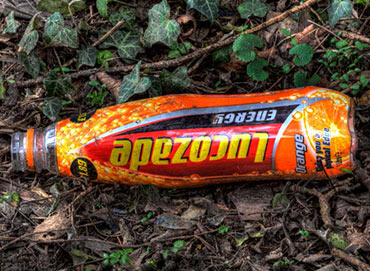
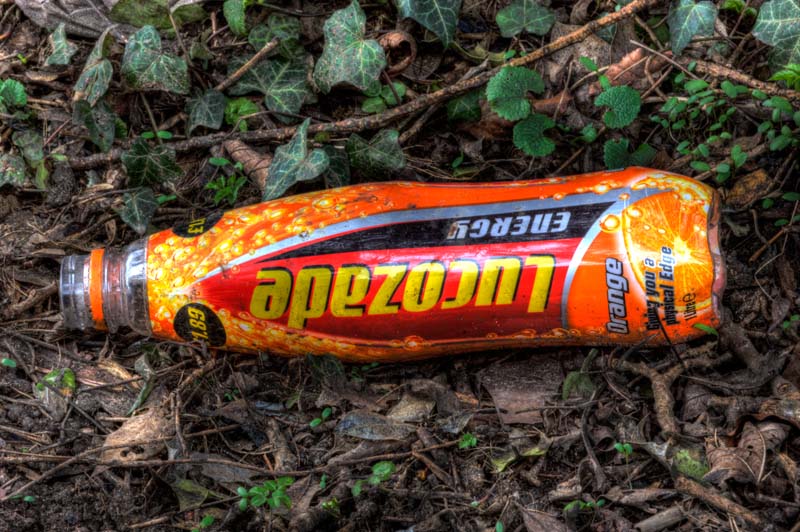
20/02/2017Will Britain embrace a plastic bottle deposit scheme?
This month our Patron Jeremy Paxman wrote a passionate piece which featured in the Daily Mail, calling for the government to back a plastic bottle deposit return scheme.
Deposit return schemes already exist in many other counties and see customers pay a small cash deposit as part of the price of a drink in a plastic bottle. They get the money back when they return the item to a collection point.
There are strong arguments for supporting a UK deposit return scheme, not least the potential positive impacts on litter, landfill and recycling rates.
The Department for Environment Food and Rural Affairs (Defra) however have said a policy is “unlikely”, although “not off the table”.
Up until this week a major part part of the challenge was the position of industry and drinks manufacturers who will bear significant cost should a scheme be introduced. However Coca-Cola have now publicly committed to exploring the introduction of a deposit return scheme:
“Our sustainable packaging review is ongoing, but it’s already clear from our conversations with experts that the time is right to trial new interventions such as a well-designed deposit return scheme for drinks containers, starting in Scotland where conversations are underway.
“We’ve also been talking to and listening to our consumers and know two thirds (63%) of them support the introduction of a deposit return system in the UK, and half (51%) say they’d be more likely to recycle as a result. From our experience elsewhere in Europe, we know that deposit schemes can work if they are developed as part of an overall strategy on the circular economy, in collaboration with all industry stakeholders. We are open to exploring any well-thought-through initiative that has the potential to increase recycling and reduce litter.’
We will be keeping close to developments and post updates as progress is made.
other articles
-
KzkazGok 2 years ago
not working
Comments are closed.


20/01/2016Jeremy Paxman calls on brands to act in the fight against litter
Jeremy spoke at the Foodservice Packaging Association (FPA) Environment Seminar, on behalf of Clean Up Britain and called on major brands to change the way the public interacts with waste packaging.
“Litter is the sort of advertising that nobody wants,” Jeremy said. “If the sides of the roads are littered with rubbish baring your logo, then you have got a problem.
“What we need to do most of all is to change the way people behave. Businesses have to make dumping litter socially unacceptable in the same way that drink driving now is. It is increasingly clear that the only way for us to win the war on litter is for all of us to come together in a far more integrated way.
“We need a coordinated, collaborative initiative involving environment boards and companies, trade unions and the private sector. I don’t think the Government will help, they’ve already failed us.”
Jeremy noted that the amount of litter in the UK had increased by around 500% over the past 50 years, and last year alone, local authorities across the UK spent more than £1bn on removing litter from our streets.
He called on the private sector to fund behavioural change campaigns that will not only reduce public littering, but “will get Government to jump on the bandwagon of a successful collaborative initiative”.
other articles
-
Frank Latham 4 years ago
Drink driving has not become socially unacceptable because of changing attitudes towards it, many people would still do it were it not for the fear of the penalties and consequences, the most feared of which is not the possibility of killing someone or a hefty fine, but a lengthy driving ban. Even then some people continue to drive after having been banned. The only thing that would deter litter louts is a fine of £1,000. There have been many petitions calling for this but, as always, our timid politicians fail to act in the public interest.
-
Charles Dodson 4 years ago
Surely educating the young while at school is part of the solution albeit a long term one. Somehow the present litter culture needs to be changed.
Comments are closed.
Partnerships

Keep Scotland Beautiful
“Keep Scotland Beautiful has worked with Clean Up Britain on a number of anti-litter initiatives in recent years and a productive working partnership has been established. This partnership allows for information exchange, research and strategy development in relation to litter prevention, and has been very positive. We are keen to continue working together through 2017 and beyond.”
DEREK ROBERTSON
CHIEF EXECUTIVE OFFICER

Littergram
We are thrilled to partner with Littergram who harness the power of smart phones and social media to help clean up Britain. Download their brilliant app and join a community of like-minded people taking action on our growing litter problem.
LitterGram works closely with councils to help them address the issues app users highlight. Their cutting edge technology is available for free to all 433 councils across the country.

Warwick Business School
We are proud to have joined forces with Warwick Business School, which has the biggest Behavioural Science Group in Europe, to use nudge theory to help address environmental issues.
Based on theories from behavioural science, nudges have been used to solve a range of issues from persuading more people to pay their taxes on time to encouraging households have their lofts insulated.
Read our report ‘Using behavioural insights to reduce littering in the UK’
"The trash and litter of nature disappears into the ground with the passing of each year, but man’s litter has more permanence."
- John Steinbeck
"Each and every one of us can make changes in the way we live our lives and become part of the solution."
- Al Gore
"We can continue to foul the nest we all share. Or we can decide to do something about it."
- Jeremy Paxman
"I’m ashamed, embarrassed and angry about the amount of litter in Britain. Bluntly, our country is a filthy disgrace. Could it be different? Of course it could."
- Clive Betts MP
"Britain has the worst litter problem in the developed world. It’s bad for the spirit to walk through filth."
- David Sedaris
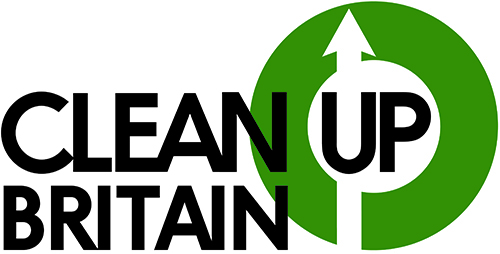













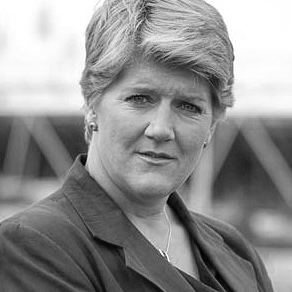

















Maidstone council were involved in a pilot project to use Littercam, a tech company using cctv and AI to detect and prosecute vehicle owners who litter. It started in 2021 but I can find no details of how it progressed. Was hopeful this tech could really be a game charger for enforcement of the law. What happened in the pilot?
I routinely drive between the Isle of Sheppey and Chatham. I am astonished how much litter and refuse is strewn at the side of the A249 and the M2,
particularly the M2 slip roads.
It is getting progressively worse and the Highways
Agency appear to be going absolutely nothing
about it.
Sadly I feel I am witnessing the Garden of England becoming the Litter Dump of England – why aren’t Kent County Council pressing for action on this.
Same in Scotland, all main roads are litter dump, this was not as bad few years ago. Let’s postpone net0 and clean our roads first. Invest in cameras and prosecute ppl that throws litter on the roads
I drove from Exeter to Tunbridge Wells and the A303 and M3 were a disgrace. An almost constant stream of all sorts of litter, but also detritus left by authorities, such as random traffic cones. We now can not criticise any other nation when ours is so filthy. Highways Agency have not even replied to my email.
Wow, I am an expat Canadian who lives in Florida and now the UK. The amount of litter I see in Cambridgeshire is staggering. Especially the plastic caught in trees.
Florida has a couple of schemes.
Those on community service are tasked with cleaning up the roads. A mile or two of a lane is cordoned off for safety.
Offenders in jail are used to pick up trash. Mostly those who with DUI of minor offenses.
Local businesses adopt stretches of road and they pay for or volunteer to pick up litter. For that there is a sign stating which business is responsible.
I have helped pick up litter where I now live and our citify has a very active volunteer team.
I agree with more surveillance and prosecution as this not only is a blight but outs wildlife at harm.
I have recently travelled from North Wales to The Trossacks in Scotland and also NW to Eastbourne. I can confirm that most of the motorways and A roads are ankle deep in rubbish. Alot of it is caught up in the hedgerows, which are the wildlife’s corridors. It’s truly horrific and depressing. I despair of the people of this country and our authorities who allow this to continue. Police crime tape is a major contributor also bits of car wreckage. Various council cones and rusty metal signs left behind. When the people who are supposed to uphold the law do it what hope is there. I shudder to think what foreign visitors must think of us. Shame on you litter louts and authorities you’re disgusting.
A1 Newark – Grantham . The amount of litter on the road side is appalling. When asked, Highways Dept said they cannot litter pick whilst the carriageway is open for obvious safety reasons, however, they can’t close the carriageway just for a litter pick as it is a major road so it will cause disruption, therefore if at any point a stretch of road is closed for other maintenance issues, they would take this opportunity to do a quick litter pick. I think they are fighting a losing battle. HELP!!!!!
Drove from Durham to London motorway A1, A1M, MI littered with torn plastic bags. Stretch gets bad from Leeds to Sheffield.
Why are councils, or highways agencies not cleaning?
Where is the litter coming from? Driving at 70 MPH on motorway, no sane motorists will even think of throwing litter.
Time to put Points on Driving licence along with fine.
Pity beautiful country sight turning into eye sore.
After driving on the weekend from Sevenoaks to Gravesend (not the most glam journey at the best of times!) I’ve done nothing but think about why on earth it has come to pass that our roads are so utterly disgusting! What bugs me the most is that there seems to be no plan to stop it at its root cause…people with the mentality to think that ‘someone else will do it’. When I was at secondary achool (I’m 49) we had litter picking duty. If we dropped it, we ended up picking it up so that was a quick learning curve right there! Of course our children aren’t able to do that any more as it’s a ‘health and safety’ issue (I have 2 girls and I have no aversion to them litter picking whatsoever) We have to educate from the bottom up…as with so many other things. The A21 Sev to Tonbridge is also woeful. Sad times…but I’m sure something can be done?
From reading these comments it seems we are not alone in Sussex and clearly it’s a nationwide problem which is even more depressing to think about. The litter here is awful on most roads but the A23 into Brighton is like driving into an apocalypse. Sofas, mattresses, huge swathes of plastic all mixed in with abandoned cones, road signs, lamps. All of which have been there for months. It’s an embarrassment. I’m almost glad to read I am not alone in the despair it makes us feel. Hard to summon any national pride that’s for sure.
What can we do?
Anyone else think we should make prisoners and unemployed welfare claimants spend time litter picking to earn their keep? Might go some way to cleaning this dump of a country. But ultimately need to educate the low breeds that throw their trash out the car window.
Quite agree yes, including illegal immigrants whilst awaiting processing.
Yes I do , but you would be faced with the growing band of woke “ do gooders” so any such plans will get thwarted within seconds. Education of thick heads isn’t easy but that’s where it needs to start.
The A21 is absolutely disgusting , from where I join at sevenoaks to bexhilll turnoff just covered in litter , lay bys are full of discarded plastic , cans and tyres . Somebody needs to do something as the problem is getting worse .
We have just retuned from a round trip from Suffolk to Yorkshire and back on the A14 and A1 and I can honestly say both roads are awash with filth and debris. On one short stretch of the A14 I counted nearly 100 shredded tyres as well as mile after mile of plastic, cans, bottles, fast food packaging, car crash debris, cones and abandoned metal sign frames. Most lay-bys were strewn with rubbish and overflowing bins and even an abandoned armchair! As one who taught my children that the full force of my anger would reign down on them if they so much as dropped a sweet wrapper, I find it so hard to understand the mentality of “litterers”. But equally where are the agencies responsible for cleaning and what are they doing about it? It appears the answer is depressingly very little. Yet somehow other countries manage to do a much better job-why oh why can’t we????
I’m just traveling up the a14/a1 back home to Yorkshire after a trip to France and I can’t believe the amount of tyres at the side of this road. I’ve attempted to report it to the Highways Agency on their website and get the usual twaddle about it being a local litter problem for the local council, how can it possibly be??? It’s caused by the A14 traffic so it should be a Highway maintenance issue surely? On another note french roads pretty much litter free, why?
I now have to take a black bin liner with me when I go on my daily dog walks. I live in a prosperous, rural part of Lincolnshire and yet every field, country lane, river way, footpath and pavement that I walk along is strewn with rubbish. I pick up a worrying amount of empty beer, cans and spirit bottles, clearly thrown from cars. I literally filled a black bin liner with rubbish this morning just walking around the perimeter of fields with farmer’s plastic sheeting, dog Pooh in bags 😳, plus all usual single use plastic, all blowing into the stream and hedgerows. I despair when even the supposed caretakers of our countryside (farmers) don’t even seem to give a toss.
Situation is becoming worse in front of our eyes yet I can find no articles anywhere on anything that is proactively being done to heal or reverse the problem. Clean ups are all well and good and obviously desperately needed but the root of the problem has to be tackled otherwise there’s no hope. Travelling in Europe is evidence that other countries can manage it so why not us? There has to be a fundamental shift in attitudes and an instillation of care for our environment. Does anyone know of anything that’s being done by government to solve this?
It is so unbelievably depressing the amount of litter on the sides of our A roads, I feel embarrassed for our visitors and tourist, how disgusting it looks. I drive a lot for my job and the A34 is dreadful, as is the A4047. The A404 from the High Wycombe round about towards Marlow is unbelievable. Just like people have tipped 100’s of bags worth of household waste on either side of the roads…..and no one cleans it up. I’ve complained to numerous councils but just get an automated response saying my complaint has been sent to the appropriate team and the request is closed. But still nothing is done 🙁
Horrendous amount of rubbish everywhere.
It also blows out of the recycling lorries on their travels as well and I’ve never seen a maintenance team pick up before cutting. They just shred what’s there into thousands of pcs.
It’s a shit show in all directions but ultimately filters down from the government. The cost should be born by the organisations that filter fast food on to the network. But it’s not just the roads. Parks, country side beach. No where is clean anymore.
Think it’s worse since we started recycling. Loose items in a bin is not a good idea. We should bag our recycling so it can’t get blown all over the place when it’s windy or blow back out of the lorries.
Last week we made the journey from Penzance to Portsmouth and Brighton to see family and friends. By the time we got to Exeter we started noticing increasing amounts of rubbish on the roadsides and on trips from Portsmouth to Brighton it was ridiculous – we look like a third world country!
If some counties like Cornwall and Devon can keep the A30 virtually litter free why is it that Somerset and Wiltshire have a much higher level and Hampshire and West Sussex are appalling?
Have we no sense of national pride anymore?
I believe this is the number 1 threat to our well being as a nation and something needs to be done to change behaviours and that starts with education and prevention and instil a sense of pride and passion for our country.
Education would need to take place at school because we have generational issues with parents who litter so their offspring do the same. Right minded parents ensure their children behave responsibly, but that does not mean to say they will.
Prevention comes in many guises, firstly local councils should use digital messaging warning people not to drop litter as they enter council jurisdictions. Simple messaging such as, Do Not Drop Litter – You are being Observed – Large Fines imposed. This would make morons think twice about catapulting waste from their cars.
Glass, plastic and cans should be exchanged for tokens so that these can be used as currency in shops. This would act as an incentive for some – this sort of scheme has worked on the continent.
People who are caught littering or fly tipping should be made to pick litter as community service work. This may seem draconian, but it’s the only way to adjust the social problem that exists.
There should be naming and shaming at every possible opportunity, so it becomes as socially unacceptable like smoking indoors.
Finally I am sick and tired of seeing our country used as a bin and it concerns me to think that if a person thinks it’s ok to drop litter without a moments thought , what else do they think is ok ?
Its horrible truly horrible and far worse than it used to be, I long to see all this rubbish disappear and the amount there is just tells me its being added to every single day, I long to see our beautiful countryside but it’s blighted by the rubbish I see. It’s even occurred to me that fly tippers are just opening up the back of their vans in the middle of the night and letting it all fly out as there just seems so much of it everywhere. Maybe a go slow by activists on the A roads and motorways would bring it to the higher powers attention, I would actually agree with that approach.
Why are community service folk not tasked to clearing this up? Are their human rights violated?
Have lived in the so called “Garden of England” (Kent) all my life and am disgusted by the amount of rubbish that has built up on the roadsides, most of which has not been cleared for years. What also distresses me is the twice yearly strimming of verges and central reservations which is done without first attempting to clear the litter, going around the larger items or shredding smaller plastics into thousands of pieces! Even Local Authority and Highways do not remove cones, signage promptly, Police leave blue & white tape in the trees/bushes, breakdown services leave old tyres/bits vehicles lying around, should it not be their responsibility to remove? Setting an example has got to be a start.
I regularly travel by coach from Nottingham on the M1, north to Leeds and south to London, the M50 to the M6 north & also many other motorways. The whole length of these highways are full of litter. There is no clear patch of the MI in its complete length from Nottingham to London for instance. It is mostly stuff thrown out of cars and lorries, some of it by the bin bag load and also other items left by contractors. It is absolutely disgusting and it really gets me down seeing it. The visitors to this country must think we are a filthy nation and currently it seems we are. These roads are in a desperate need of a clean up and more cameras and high fines are needed immediately. (Can someone please design a large scale vacuum to suck up the smaller items?!) We need action now, not just words.